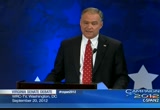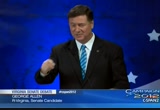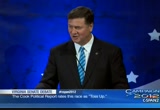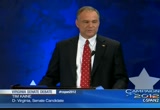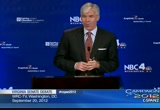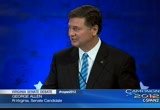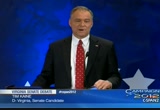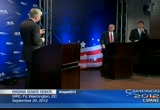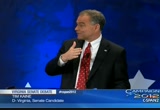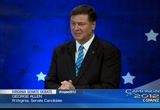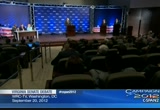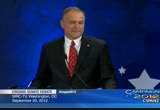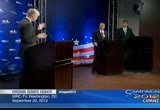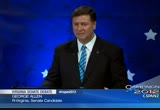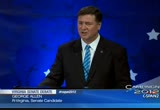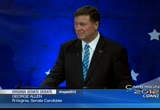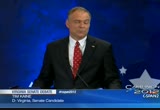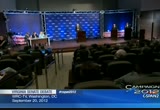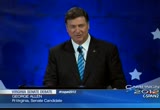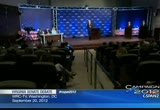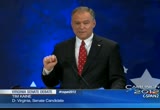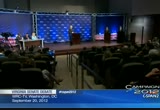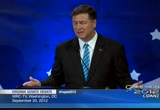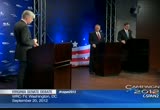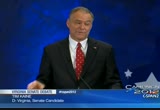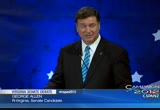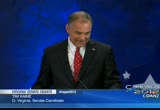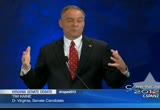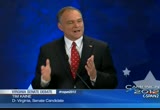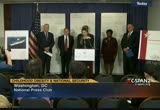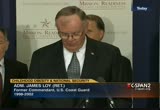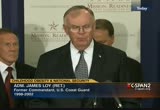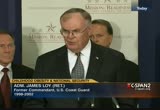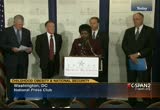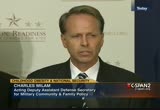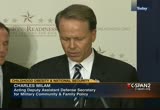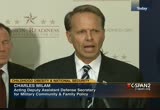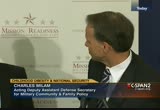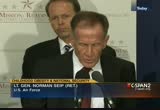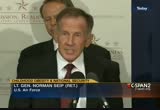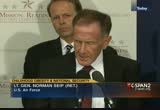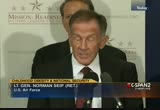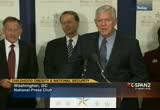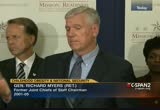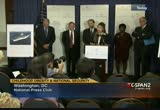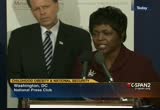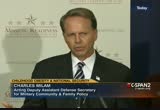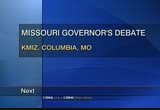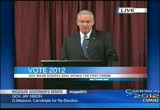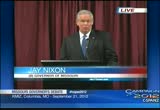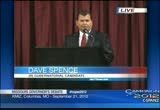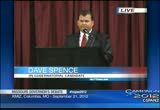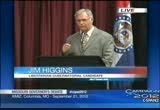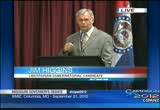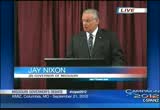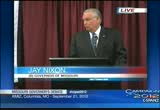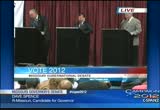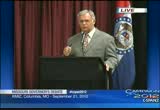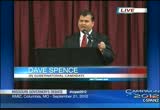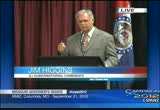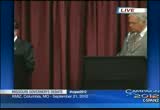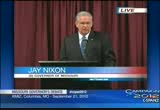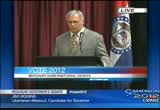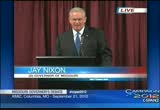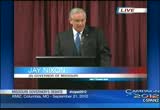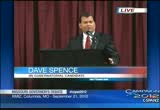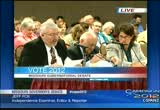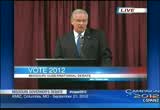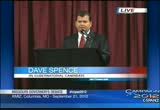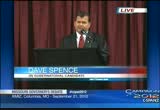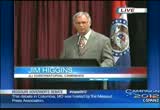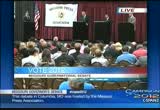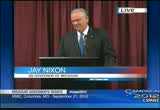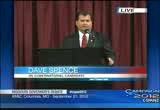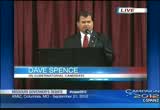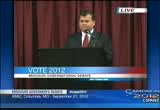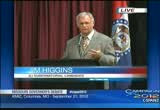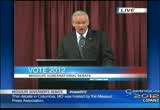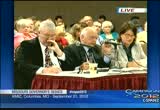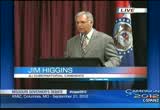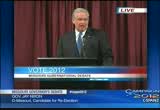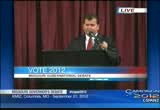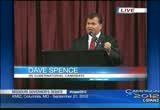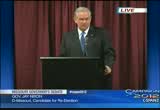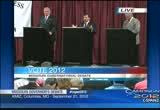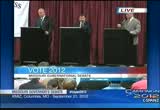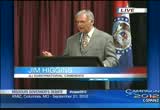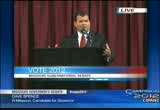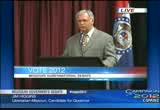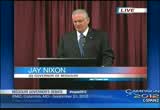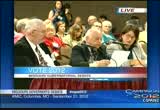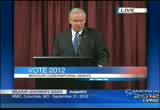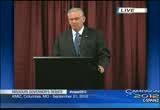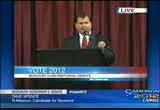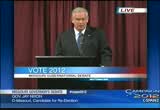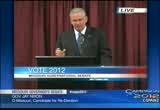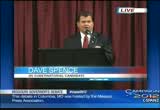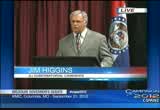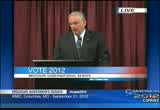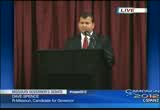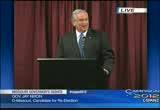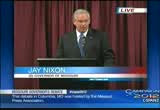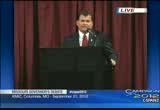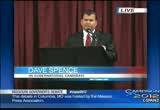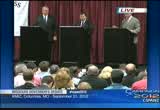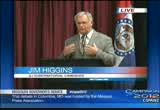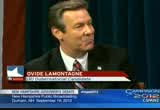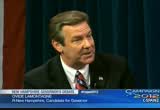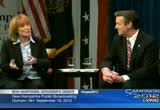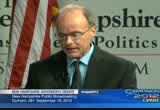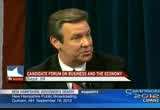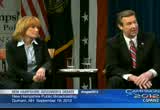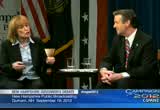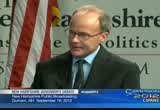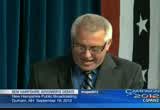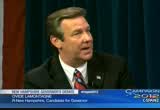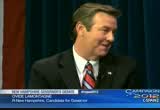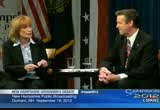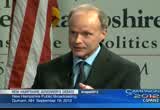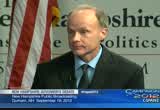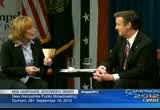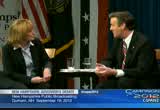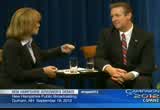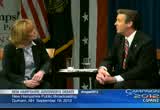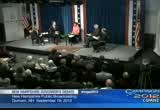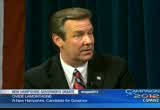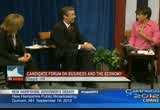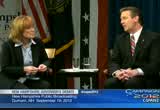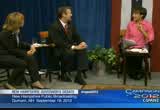tv U.S. Senate CSPAN September 25, 2012 5:00pm-8:00pm EDT
5:00 pm
indicated is to do the tax reform that broadens the base and includes more taxpayers along the way for the question that david asked earlier that cells in the deductions and exclusions and then reduces tax rates. you can do it and make it simpler so they don't have to have a feeling account to do that. ..
5:01 pm
>> people who have made investment decisions based upon the tax code, and to just all the sudden change it would be unfair. however, if people want a simple tax code with fewer deductions or no deductions whatsoever and fill it out on one sheet of paper, multiply it by whatever the tax rate is, let the taxpayers decide. this is an idea i've advocated for many years. it's really what hong kong has done, and many of the people in hong kong with the freedom to choose flat tax went to the flat tax. for businesses, right now, our federal government imposes the worst in the world, 35% tax on job creating businesses in our country. the average is 25%. i advocate reducing it to 20%
5:02 pm
because i think america should be better than average. doing that will help create over 500,000 jobs a year. that's an inpent analysis. tim's view is one of increasing taxes. folks, lower taxes create jobs, greater opportunity, makes our country competitive, and it's amazing to me that tim, who would raise taxes on people buys used cars and folks earning as little as $17,000 a year will then will be put in jeopardy, the hundreds of thousands of defense and technology jobs, and in my view, the men and women in our armed forces should never be used as a political bargaining chip to raise taxes on job creating small businesses. >> when you eliminate deductions, would you do that for everyone or high income earners? >> first, i'll point out the last rhetoric about taking
5:03 pm
veterans hostage on economic issues. that's exactly the kind of name calling we've got too much of in washington. we can debate policies, but that's the name calling we've seen too much in washington, and what's wrong with washington is not going to be fixed by more of that. now, back to the issue. george talked about his tax proposal. he was a u.s. senator. he was a senator for six years. during his time in the senate, his fiscal policies turned masses surpluses into massive deficits. the federal deficit went up $16,000 every second george allen was the united states senator. voted to raise the debt ceiling four times, voted to raise his own salary four times. now he's talking like a conservative, but his record shows he can't have another crack at it because his actions don't match his word. again, i think the right strategy is an aggregated
5:04 pm
examination of deductions rather than fighting issue-to-issue. you can have the amount or percentage vary by income or how the tax code is already. that's the most likely path to lead to success. >> we're out of time on that answer. >> can i have time to rebut? >> not according to your rules. i like more than less, but going on. >> governor allen, virginia voters are divided on whether they want the affordable care act to stay or go because it's not completely ruled out and because it's so complex. do you want to completely get rid of the law as a stands and start over on health care reform from strach or favor -- scratch or favor another method? >> i'll use the first part to rebut comments tim made. tim talked about $16,000 of
5:05 pm
debt. now it's the spending in washington has gone up to $54,000 per second in spending. tim contribute sideses tax -- criticizes tax cuts past, but they created 7 million jobs after the devastating attacks on this country in 9/11. the ideas of who is fiscally responsible and who creates the most jobs k i think our approach will clearly improve job opportunities. on the health care tax law. that's also an impediment to jobs. i heard from so many small business owners, community hospitals that this is so harmful to them. small businesses don't want to get over 50 employees. some make their employees part time, making it tougher for the employees who have to find another job to make ends meet. it is also a cost that some employers are going to drop their insurance and other employees lose it. now, i think it ought to be
5:06 pm
repealed and replaced. there's some provisions that are good in it. i think covering children up to age 26 on a parents' policy is a good idea, especially since one-third of students graduating from college in this weak economy are having to move back home. i also thing we ought to have personalized, more affordable health savingsing the, port l, people can take them from job-to-job. here in the northern virginia community, bobby here with the virginia technology council, folks are in three jobs before the age of 30. that's a good idea. i think small businesses, many which are in the room here, y'all ought to be able to ban together across state lines for competition and more choice in affordable health care, and i also think we have to allow the states to have greater flexibility in managing medicaid and do it much more efficiently. >> all right, governor? >> i'll start where george started defending the senate record. the record was putting fiscal time bombs into the budget that are still going off today.
5:07 pm
the decision to wage two wars on credit card was unprecedented in american history. nobody's done that. nobody certainly cut taxes trying to wage war. the decision to expand medicare without paying for it is unprecedented. the decision to have tax cuts and exist in the notion they are permanent when the cbo said they had to be temporary or bust the budget is demonstrating a second term would be just as damages as the first term. there's been 33 votes to repeal the affordable care act already in congress, and i think there was a lawsuit, too, that got a little bit of attention. the last thing we need to do as a nation, on this issue or anything else, is spend our time looking in the rearview mirror. we don't need to go back. george allen was in the u.s. senate, and the number of uninsured people went up by millions when he was there, and premiums up 60% when he was there.
5:08 pm
we do not need to go back ward. george acknowledged positives about the bill, and we have to battle forward and do more positives around fixing costs to control them. this medicare idea that i put on the table is a way to find cost savings in medicare to bring down health care costs in a way to help the budget, help seniors, and won't jeopardize the quality of the program. >> but governor kaine, there's 6 million americans who want to look in the rearview mirror if they look at the report from the cog #* congressional budget office just today indicating that that's the number of those facing, in effect, a tax increase, in mountain middle class, for failing to actually get health care as pursuant to the individual mandate. that's 2 million more than originally thought out. take 30 seconds to respond to that as a problem area. >> sure. there are fixes that are necessary. that same group of people will have the ability to purchase insurances on health exchanges. that same group of people has
5:09 pm
the ability to get free preventative care under medicare or prescription drug discounts under medicare, and that same group of people can no longer be discriminated against because they are women. they are protected against insurance companies abusing them because of having a pre-existing condition and denying them coverage. there might be a cost, but the cost was already born. it was just people going to emergency rooms and seeking here and shifting costs to the rest of us. individual responsibility is not a bad -- is not a bad principle. >> a minute to respond to that. there's a basic philosophical -- >> don't i get a minute and a half? >> according to the rules, you get a minute. >> all right. >> i promise you, i'm not making this up as a go along. >> you gave him an extra -- try to get the extra 30 seconds. >> taking time away from you as we debate the rules. >> go ahead. >> are you committed to coverage, and if not, how do you get provisions retained in health care without universal
5:10 pm
coverage that gives you scale? >> well, there's so many things wrong with the current health care tax law. part of the way, in addition to adding a trillion dollars in spending over ten years, taking $700 million out of medicare. this is why seniors are so concerned about whether they'll have access to doctors and many doctors i've heard from, susan has as well, said we're not going to take more medicare parties. the way to look at this is have health care decisions being made by doctors and patients, not bureaucracies up in washington. that's why health savings accounts are the way to go. those with lower income, make it reversible tax credit where people get coverage for major medical procedures, and by having a portable, that means somebody moves from job to job, they don't have to worry about a pre-existing condition that they or somebody in their family may have so, to me, that's the positive approach that puts people, doctors, patients,
5:11 pm
hospitals in charge rather than washington, and, to me, that would be a paradigm shift. the solution is not rating over $700 billion from medicare, which is a system that we do need to make solvent, and right now, it's in very precarious shape. >> we'll leave it there and take a quick break. we'll be right back after this. we'll continue now. >> governor kaine, we want clarity on whether same-sex coups should be issued marriage licenses like straight couples are. you support relationship equality under the law. in order for all relationships between couples to be equal, wouldn't all couples have to be allowed to get a marriage license? >> aaron, you know, as i get older, i've come to the conclusion that being for equality is never a bad thing. we don't make a mistake following the basic constitutional prescription that everybody should be entitled to
5:12 pm
equal protection under law. my wife's here, and i'll just say that the relationship we had for 28 years is i hope something everybody has. the ability to have a long-term committed relationship celebrating the joys, and you mourn the losses and the tribulations, where you create name and a network of friends, where you build up a store of memories to sustain you into old age. i think everybody should be able to have that kind of relationship regardless of their sexual orientation. i want everybody to be able to have it and not hide it. i think it ought to be subject to be legally recognizedded and legally celebrated. that's why i do believe that, and that relationships should be treated equally under law. same legal rights and responsibilities. i would allow churches, as they do today, decide which relationships they recognize in the church. i would allow state legislatures
5:13 pm
to make the decision about whether they would title a same-sex relationship, civil union, or domestic partnership, but the test is whether the legal rights and responsibilities that someone else has, they should be able to have the same legal responsibilities and rights that i have. >> i want to pin it down. do you believe in gay marriage in the way that president obama clarified his stance recognizing the institution of marriage as being possible and should be legal between a map -- man and a man and woman of a woman. i would let state legislatures, baa the rules and relations about marriage have been state policy, i would let state legislatures make the decision about whether they would accord that legal protection to a same-sex -- >> you're not prepares -- >> no -- >> you're not prepared -- >> let me finish. i would be fine if that di it, labeled it marriage, civil
5:14 pm
union, or domestic partnership. are people trited the same and given the same legal rights and responsibilities, i think legal equality should be the policy. >> governor, a minute and a half. >> well, i believe marriage should be between one man and one woman, and that's the definition i've supported. i don't believe in discrimination against people on account of their sexual preference. as governor, that was our order for state government, how i operated the senate office as well. i look at people's capabilities, their skills, their willingness to be effective in advancing the ideas that i always feel is most important, and, to me, the most important thing that somebody does in public service is to make sure people have job opportunities, and we talked about the health care measure. you know, that health care measure is a real impediment to jobs. folks here in the audience, whether you're a large or small business, this health care tax law is an impediment for you
5:15 pm
growing your business. it's an added cost. i heard from small business owner, a woman, who said her husband works for a company with 30 employees -- excuse me -- 300 employees, and they were going to drop insurance. this is disconcerning. that's why when you talk about what's the best social policies for the country, jobs. jobs are the most important as pelgt of it all -- aspect of it all, and the family is the most important institution in the society, but judge people by their character, competence, and not by the color of their skin, religion, ethnicity, or their sexual preferences. >> before i go back to governor kaine, governor allen, another social issue, an issue for republicans generally. why do you think you pull so much better -- poll so much better among men than women? the gender gap favors your charger by 14 points. is this a republican party problem with women? take 30 seconds if you would, sir. >> okay. [laughter]
5:16 pm
i think we're going to do very well with men and women, and i think after this debate, and people will listen to my approach and that of my opponent, my friend, tim kaine's, women, mothers, who i talked to, married or unmarried, care about jobs and the economy. if they are unmarried, they are working. if they are married, they may be working or caring for the future of their families. 50% of young people are unemployed or under employed. we'll get support from men and women and folks get united behind the positive constructive ideas sending a message to the world that america is open for business with the right tax, regulatory, and energy policies to get the country ascending again. >> a one minute rebuttal. >> it's demeaning to suggest issues with women are just social and not economic. they are economic issues. the status of the relationship,
5:17 pm
if they can't have a relationship recognized, inability to get insurance policy, inability to get other benefits, less favorable tax treatment, that's an economic issue. with respect to women, if you force women to have an ultrasound procedure against their will and pay for it, that's an economic issue. if you deny women the opportunity because of personhood legislation, to make constitutional choices, even including whether to purchase contraception, that's an economic issue. when george allen was in congress, he repeated voted against family medical leave act. he's supported the blunt amendment to enable employers to take away contraceptive coverage for their employees. these are women's issues, but they are bigger than that. they are family issues, and they are economic issues, and it's demeaning to suggest the little social issues we don't need to spend time. we have to talk jobs. women are more than half of the economy. we have to make the right policies about women if we want the economy that we want. >> we're going to move on.
5:18 pm
julie carry from news 4. >> governor allen, six years ago, you lost a race everybody thought was yours to win in large measure because of a verbal insult directed at a democratic campaign worker, what was viewed as an ethnic slur. that apologized, but that lingers in the minds of voters. what do you say to those who are still troubled by the moment? why give you a second chance? how did the incident change you as a candidate and a person? >> well, julie, and all of you here, i've stated on many occasions that was a mistake, i apologize for it. i never shawf down that young man into the debate. he had a hard job to do following me around the commonwealth of virginia. losing is a humbling experience. i didn't like losing. you learn sometimes much more from losing than from winning. one of the things that my father always taught me and anybody who is in sports would say we get knocked down, you get back up.
5:19 pm
we want to make sure this campaign is focused on issues that people care about and whether someone's a woman or man, they care about jobs in the economy more than anything else. susan and i work as hard as we can to ensure the campaign is one that motivated and inspires people, to positive constructive, proven ideas. it's not just rhetoric. it is our record that i had as a governor as well as united states senator to make this country more competitive for investment and jobs. in virginia, we were able to work across party lines with the democrat majority in the legislature. we were able to get our economy moving, and with that, with tax cuts and reducing the size of state government, over 300,000 net new jobs were created. tim can't say that, trieded to raise taxes by $4 million. tuition skyrocketed in virginia by over 30%, and over 100,000 jobs were lost in virginia during his four years. those are the two different
5:20 pm
approaches, and i think ours is one that uplifts and empowers and provides more americans with greater opportunity to control their own destinies. gling the biggest -- >> i think the biggest question virginians wrestle with thinking about the election is looking at a congress that's broken, and it's broken because people won't work together. we don't have a shortage of ideas in the nation. we don't have a shortage of resources in this nation. what we have a shortage of is a willingness to compromise, find commonground and work together. we debated earlier, and i pointed out, look, we all make mistakes. public life and in public view, but the sentiment that was the challenging one was the notion that this young man had to be welcomed to the real america and to the real virginia. that was the challenging one. we lived through a state, and a lot of issues separated real
5:21 pm
virginians or other virrians, and we've seen that this week at the national level, that the sentiment is out there. we're only going to solve the big problems, balancing our budget, dealing with a new energy future, if we work together. george, you famously said as governor, you enjoyed knocking democrats' soft teeth down their throats, and you didn't say that with a smile. you said similar things as a senator against senator clinton pushing the stop hillary campaign. some of it might just be sports or competitive rhetoric, but that's not what it's going to take to fix washington. we need bridge builders and people who find commonground. that's what's missing in congress now, and we need people in place with a dmon --
5:22 pm
demonstrated track record and able to do it. >> tim, you pick out certain quotes from me, and i'll share with quotes with the people about the records of service. the washington post, rarely says anything good about republicans, said this about my service as governor, quote, "while some republicans hold alouisiana applause, and the general assembly, the fact is governor allen is markettedly successful in generating business investment in virginia. the virginia education association said our education budget was the best they'd seen in a number of years. senators clinton and wyden, and carey, we worked together. they publicly stated how we worked together on issues whether it's health screenings of newborn children or expanding access to broadband, and then when tim was taking office, here's what a newspaper said, quote, "if tim kaine is looking for a role model as the chief
5:23 pm
executive, george allen's term as governor was one of the most con convince issue in the 21st century" that was about job creation and freezing tuition, and the champions of small business and job creators know my record and know tim and the u.s. chamber of commerce, and the nfib -- >> time. >> endorsed me. >> that's time, governor. >> governor kaine, turning to libya, there's reports suggesting the u.s. consulate in benghazi nay not have had security despite the warnings of the heightened risks. do you think the obama situation could have handled better before or after the attack? >> i don't know the details. we have to study it. i'm sure the answer to the question is yes. when something goes wrong, there's always something you could have done better. whiffs governor, but -- when i was governor, by darkest
5:24 pm
actually was april 2007, a shooting in virginia tech, the worst crime in the history of the state. i landed in japan on a trade mission, and i got back on, flew back, and i dealt with grieving family members in the community, and what i said from day one is we're going to put in place a panel of people with a broad expertise with no connection to virginia tech, and we'll have them turn it upside down to determine everything that could have been done different to minimize the chance that anything like that happens again. we can't prevent it, but we can minimize that chance. we found a lot of things that could have been done better. things that might have happened at any college campus, but it required us to make significant changes to the menial health laws, significant changes to help folks who were adjudicated men tally ill to getting firearms, changes to campus security. things went wrong, dug into them, found them, and we fixed them to the best of our ability. i'm sure there are things that went wrong that led to the death
5:25 pm
of the wonderful ambassador and others including a man who was just married yesterday in winchester, virginia. i'm sure things went wrong. the administration has to dig in deep as they can, find everything that went wrong, we solve to fix them so our diplomatic personnel around the world keep doing the good jobs they do and be safer. >> is this is broader issue with the obama administration's response to the arab spring? >> in some regards, yes. i want to take a moment to commend tim as i have before in his leadership on after the tragedy on april 16th at virginia tech. at the time tim and all virginians united, learned from what went wrong and improved the safety of our colleges, and so, tim, i commend you again for that. now, in so sofaras national sciewrs, there's a lot of
5:26 pm
challenges facing us. we had an uprising in iran years ago when people wanted a free and just society in iran, and i just wish the president said we're on the side of those who want to change that thee i don'- theocracy. when ronald reagan called the soviet union the evil empire, that gave heart to the prisoners. if iran gets nuclear weapons, that needs to be prevented. you have worries about particularly in syria, a chemical weapon stockpiles, you have the tax on embassies and consulates in libya and egypt and elsewhere around the world. it's why it's so dangerous and wrong to be playing these political games with our armed services. we need to be strong, a strong economy to have a strong national defense, but the last thing we ought to be doing is
5:27 pm
having devra devastating cuts te military readiness, and that's why what has to happen is responsible leadership, stop the devastating cuts k come together, have cuts that set the right priorities and ensure the men and women protecting our safety and our freedom and our elections here have the best armorment, the best equipment, and make sure we also keep those good paying jobs and technology and defense here in virginia, not use them as a pawn to raise taxes op job creating businesses. >> governor kaine, one minute. >> i'll go at the last point. no one's talking about using the military or veterans as pawns. i mean, i have not heard that stated by nip except george throwing that charge at me, and that's, you know, that's the kind of charge that you ought to be careful about. i take second to no one in appreciating the service of our folks in active service and in the military. i was governor in the middle of two wars, our virginia guards
5:28 pm
people, 15,000 of them deployed on the war on terror, and i went to the homeçó comings, deployments, wakes, and ish -- iraq and afghanistan, and now i celebrate units that are home. we have to get to a resolve point on the budget issues so we don't hurt defense. i have a concrete plan so we, in the short term, avoid cuttings so we don't harm defense, but protect the economy. that's not about taking anybody prisoner. that's trying to solve a problem. we got to have problem solvers in the senate if we're going to get through the gridlock. >> i want to stay on national security for a moment. there's a moment to respond to it. the war in afghanistan, a decade-plus now. the issue is that our troops are being targeted by afghan troops, the very troops we are standing up so we can stand down. governor allen, beginning with you. can we accomplish the mission, withdraw troops from afghanistan
5:29 pm
if we don't have an afghan army sufficiently stood up. do we have to stay longer? >> first, it was not a good idea in the first place to let the enemies, opponents know when we were leaving. that just didn't make sense. the men and women who served in afghanistan and are serving right now are heroic, and their families are serving as well. i think we've begin the afghan people in their regions, in their provinces every opportunity to stand up and take control of their own destiny, and so there will be ways as troops come home, and they come home with heads high. unmanned area vehicles, drones, and, and there's ways to monitor the area, precisely strike if there's terrorist activity, and not just there, but in the border area of pakistan. what's going on right now is just a reminder that the afghan people need to take control of their destiny, americans
5:30 pm
invested blood and treasure and injuries of so many who served there. until afghanistan -- if the afghan people don't stand up for themselves, we can't do it for them. >> governor kaine, one minute in response to the question. >> i'll agree with that last point of george's. the u.s. can't be the guarantor of civil society in afghanistan. that's afghanis. i think the mission of the united states' presence in afghanistan was completed with the death of bin laden and essential elimination of the top leadership in al-qaeda. we didn't go into afghanistan to remake civil society. we went into afghanistan after 9/11 to get bin laden and al-qaeda. the continuing -- i am glad we're now having completed that mission, we are now withdrawing troops from afghanistan. the challenge that i think we have going forward is the very porous nature between afghanistan and pakistan, nuclear natures and propegs of
5:31 pm
instate in the region potentially putting the nuclear arsenal at risk. that has to be the primary focus moving through the draw dawn to ensure we do all we can to keep the pakistani nuclear arsenal from getting into the hands of folks who do other nations harm. >> we reached the point for closing statements. governor kaine, two minutes, sure. >> thank you to safed -- david and the panelists. i thank george as we've been competitors for 17 months working hard, our families working hard, and teams working hard. while i wouldn't necessarily take him as my role model on policy issues, i do remember when i started to get into statewide politics, and outside the neighborhood of rich monday, he was viewed as a role model in the vigor he campaigns and the fact he enjoins campaigning. a lot of people make it look like root canal surgery.
5:32 pm
you enjoy it, and so i do. i start with that. we need a washington about results. you know, last year in the aftermath of the debt debacle, we got a bond down grade, and that's telling looking at the reason why s&p down graded america's credit. they didn't because they didn't like the mechanics of the deal. they down graded it because they said too many people in the american leadership class were willing to use a debt ceiling vote that was a routine vote as leverage over the economy. too many people played chicken with each other on capitol hill rather than looking at the # 00,000 plows american people depending upon them doing the right thing. fix washington so it's a place about results. we have to grow the economy. we talked strategies tea. i have a plan on the website about infrastructure investment, the kind of small business level, the playing field that we did. we have to find commonground and fix the budget. our congress is stopping progress right now.
5:33 pm
there's too much division in congress which is why s&p and moodies says we have to put people in there willing to compromise. the challenge that's on the table before us right now is the issue of sequester. today, i laid out a simple straightforward plan, let the bush tax cuts expire as planned over 500,000, six medicare, take away unnecessary subsidies, and then there's a $100 billion annual cut down to a $23 billion in savings that i know we can find. it's time for specifics. it's time for action. it's time for working together. >> thank you for this opportunity to have this debate here today. tim, you've kept talking about that plan. we still don't know how many jobs would be affected. you want to raise taxes on exxon-mobil and others. now, folks, there's a clear choice in the senate election and which approach will be best for jobs here in our country. i end vision a -- envision a better future than today.
5:34 pm
david asked about, you know, who are you targets in your campaigns? you ask various percentages. i figure 99% of the folks should be on our side. anybody who uses electricity, anybody who drives a car, anybody who pays taxes, anybody who works for a living or wants a job, or anyone who cares about their family's future ought to be on our side, and i figure that's 99% of the people, and, why? because electricity prices with the cap-and-trade energy taxes tim supported cost skyrockets electricity, and, in fact, the technology community here. the people are paying $30 more every time you fill up compared to january of 2009. if you like higher gas prices, you're find, but if you want it more football, -- affordable, and i want to produce natural gas off the coast and use royalties for roads and transportation. that would be the first bill i introduce as senator. if people want a job, our
5:35 pm
approach is create job opportunities for people, and whether it's young people or middle-agedded folks, 20% of folks in the country are under employed or unemployed. we have to turn that around. i respectfully ask for your support, talk to your associates, your friends, neighbors, and if they use electricity, drive a car, pay taxes, want a job, or care about the future of the families, join the allen team, go to the website, and i look forward to ensuring that america is ascending once again, a land of opportunity for all to catch their dreams. >> governor allen, thanks very much. thanks to both of you. that concludes the debate today. i thank the fairfax chamber and of course to the governors for their participation. thank you to the terrific panel today, julie and aaron. don't figure. stay with abc news for continuing coverage of decision 20 # 12, and don't forget to
5:37 pm
>> this is 25 minutes. >> very good. good afternoon. i'm the national director for mission readiness, non-profit, national security organization of over 300 retired generals and admirals who care deeply about the national security of this country, and who support the smart investments in america's children that will ensure a strong defense down the road.
5:38 pm
please take this opportunity to turn off your cell phones. thank you. joining us today are four distinguished retiredded military leaders and a representative from the department of defense who are very concerned that childhood obesity poses a real threat to the long term national security. let me introduce our speakers. general richard myers, u.s. air force retired who served as chairman of the joint chiefs of staff from 2001-2005. admirable james loy, u.s. coast guard retired, former deputy u.s. secretary of homeland security. lieutenant norman, u.s. air force retired, and mr. charles, acting deputy, secretary of defense for military, community, family policy u.s. department of defense. our first speaker is admiral james loy. we'll take a few questions from the media after all speakers
5:39 pm
concludeed, and we'll have one-on-one interviews which many reporters requested. thank you. >> well, good morning to you all. thank you, amy, and let me say thank you to you, again, for your personal commitment to the cause. if you folks think herding cats is difficult, try 200-300 officers. [laughter] thanks to the leadership of amy's team, we made very good progress over two years. the initial report entitled "too fat to fight" prompted attention and importantly so. it called for standards in the menus across the country. they are in the process of being made into action today. today's report recognizes that our kids have other sources of things to feet in the school day and challenges the government authorities in the process of effecting standards to set equally strong standards for
5:40 pm
what kids can find in vending machines, what's in school stores, or in the so-called ala carte calf fear -- cafeteria lines. there's too much junk food available to the kids in school, and we who have the national security in mind of interest have to do something about it. my colleagues offer concerns and comment on the report. let me just offer a couple simple facts to get us started. fact number one. 400 billion calories of junk food sold in the schools every year. fact number two, if that was all candy bars laid end-to-end, it circles the globe six times. one in four of the children are ineligible to serve in the military services because they are too overweight. that's 25%. the next closest disqualifier, i
5:41 pm
think it's asthma, that's only at 4%. fact number four, it's actually very easy to link this obesity epidemic to its impact on the national security of our country. we are trying to lead and manage an all-volunteer force and 25% of the candidate pool from which we draw those people is simply ineligible to serve. fact number five, to the people on this stage who commanded troops and combat and know the physical rigors of military service, this is simply an unacceptable trends that has to be reversed. none of us want the seal assigned to the recent mission in pakistan to come up short of his mission because he's out of breath. none of us want the rescue swimmer jumping out of the perfectly good coast guard helicopter into a 45-foot sea to be anything other than totally capable, mentally and
5:42 pm
physically, to discharge the duties that they have and to save the lives of that fishing crew before their boat sinks. that's why we are here today. my colleagues connect the dots for you, and so allow me to introduce brigadier general belinda pinkney to provide information on this issue. >> thank you, good afternoon. the most important asset is a air force, coast guard, or whatever, and so consider this shocking reality. according to the department of the defense, an estimated 75% of young people coming into or attempting to come into the military these days are unable
5:43 pm
to join for three keyñi reasons. poor education, you know, the high school dropout rate is still very prevalent, they have a serious criminal record, or they are physically unfit. i got to experience that firsthand in one of my assignmentings -- assignments at a training post, and i was responsible, the senior person responsible for ensuring that those new recruits coming in could pass a pt test, could meet the height and weight standards. we invest a lot of money and time, a lot of resources in these individuals, and unfortunately, oftentimes about 1200 of these recruits do not even stay in the military for the extended period of time. we invested money and time and the money normally is around $50,000 per recruit.
5:44 pm
i'm a finance person with a comptroller background, and the return on that investment is not very good. that's not the only issue. as a result, military service is now out of reach to a lot of young people. a shrinking pool of eligible recruits is a threat to the national security and we are troubled by the impact that this can have on it is preparedness, the skews of upcoming generations. this is not a new issue. we have to do something about it. it actually does threaten our all volunteer force. it's a national security issue. we know obesity rates among children increased dramatically in recent decades, and this has affected who can join the military.
5:45 pm
again, one in four young americans are just too overweight to enlist. that is an estimated 9 million young adults between the ages of 17 to 24. being overweight or obese is the number one medical reason while young adults cannot join the military. as these alarming figures show, childhood obesity is more than just a health problem. it's more than just an economic issue. it is, in fact, a national security issue. the department of defense has played an important role not only in addressing the obesity issue within the military, but also acknowledging that weight issues can play a role in reducing the pool of young adults who qualify for military service. i'm proud to introduce the next speaker who will speak briefly
5:46 pm
on the military's concerns and obesity within the military and among the potential recruits. thank you. >> so thank you very much, and thank you, amy, and to the leadership and mission readiness for inviting the secretary of defense's office here to address some of the work that we're doing in dod. as part of the national prevention strategy, the dod has stood up a health promotions working group, and we've been tackling the issue pretty aggressively in the past year and a half to fight obesity for service members and their families because we believe that, you know, that children can certainly influence their parents and parents innuance their children. we are taking this from a holistic standpoint. i'm proud to announce that we have been moving forward with some of our progress in our schools, in our child development centers. we partnered with the usda,
5:47 pm
adopting standards they have in the schools. we've been doing the same revamping the menus in the school programs, but i'd also say that just represents a small number. we have 2 million military children in the active guard and reserve component, and of that, we -- only 5% are represented. the work that mission readiness is doing impacts the other 95% in those communities. we've developed extensive data bases for leading practices, for new programs like community and school gardens. our schools are in the process of updating menus to promote tastier and healthier food. we're also working with some leaders in cafeteria makeovers and the dining facilities. cornell university uses the stealth health concept we have become to know. from a nutrition stand point, we
5:48 pm
have the nutrition assessment tool to comprehensively evaluate the eating environments on our bases. we developed the go-for-green program in the dining facilities. instead of individual labeling of food, we started to color code those foods. green, eat frequently, yellow would be less frequently, and red you try to stay away from. the army's developed an initiative called "the soldier fueling initiative," and those who need more calories and nutrition, rather than eating bad calories, bepromote the healthy options out there. the fueling fitness program, which provides tailored fitness and nutrition programs for their subs, their ships, and, of course, ashore. we are working with exchanges in the fast food operations on the installations to bring in more healthy options. new food just opened up at aberdeen proving ground. there's an aggressive campaign to go out and push some of the
5:49 pm
standards that we are looking at. we've always been a leader in health and wellness and fitness, but we realize we cannot do this alone. 75 #% of the service member and families live off installations. our focus is to work together with the community partners and mission readiness to continue to promote these efforts. at this time, i'd like to turn this over to lieutenant general. >> thanks. good afternoon, ladies and gentlemen, and thanks, again, for taking time from your busy schedules to be with us here today to talk about a very important issue, and that's obesity. obesity among the youth there. as pointed out two years ago, we released a report "too fat to fight" indicating one in four of the 17-24-year-olds are ineligible to join the military because of being overweight. the report also pointed out the fact that a lot of our poor nutrition is found in the schools.
5:50 pm
we're not picking on the schools, but the fact of the matter is many of the children consume 40%-50% of the calories in the school each and every day there. it's an area that we can focus on. you know, after we launchedded this report back in 2010, the vast majority of the members of mission readiness went on record, and we basically urged congress and the administration to go after nutritional standards with regard to the meals that were served in school, and our leaders in washington, surprisingly, responded in a positive way and very bipartisan way, and they passed the healthy hunger kids free act, which was very impressive. that falls all the way back to 1946 starting the first federal lunch program identifying 40% of the young -- at that time, just young men rejected from service because of being undernourished. today, we're nourished with the
5:51 pm
empty calories as we call them. the legislation is very detailed. a lot of things that are directed to the department of agriculture to do, but two of the key things is the first step which is to improve nutrition in the launches served at school there, and we're here to report that the department of agriculture's making great progress. there's a ways to go yet, making great process, and the kids out there are eating healthier each and every day. the second step is to take decades' old standards and tackle what's called "competitive foods," and that's what's sold in the vending machines, in the ala carte lines and school stores there. as admiral noted there, 400 billion calories equaling the weight of the uss midway, 90 million pounds. that's a lot of empty calories going into our kids there. the new standards a that are coming out were not done in a smoke-filled room. they were not done under a
5:52 pm
flashlight. it was done with all the best and brightest out there from the medical community, from our schools. i think the department of agriculture received over 130,000 inputs as far as our nutrition standards, and although every one of the inputs is probably not in the legislation, a vast majority are, and the proof in the pudding is the department is about ready to implement the new standards in the vending machines as well as the alla cart lines. why is that important? because, as i said before, many of our children get 40%-50% of calories at school each and every day there. experts, including the institute of medicine, says school is a focus. they are not the solution, not the silver bullet to the problem, but they could should e focus in dealing with childhood obesity reduction efforts there.
5:53 pm
we believe schools can play a critical role in reversing childhood obesity, and ultimately strengthening our national security. i'll tell you this is the team effort. this is not a spectator sport, but full contact. it's not just the school's responsibility or mom and dad's responsibility. everyone has a chance to play in this whether it's the various levels of government, whether it's the medical community, our schools, our parents, our kids that are actually obese or overweight as well as and in particular the beverage and food industry. we all need to play because at the end of the day the next junior college ration of children growing up deserve nothing less, and we, as the adults in the room, owe them nothing less in our commitment to this. ladies and gentlemen, it's with great pleasure to introduce the former chairman of the joint chiefs of staff, richard myers, who will talk about, you know, how we got to the figures that we've been throwing out to you today and what we believe our leaders ought to do with regard to the next steps to tackle
5:54 pm
childhood obesity. thank you. >> good afternoon, everybody. 400 billion calories, a shocking fir, but that's based on good research. on any given day, 40% of children in elementary school through high schools, 16 million children overall, consumed one or more high calorie, low nutrient food obtained at school, but not part of the regular school lunch program. these students gained over 130 # calories a day from these junk foods which then equals the 400 billion calories a year. why is this so important? i think you heard that already, but that's because there's now strong evident -- evidence of replacing these empty calories with strong foods could reduce the childhood obesity epidemic. they stopped selling junk foods,
5:55 pm
made improvements in nutrition, physical activity, and child and parent education in the schools and city wide, rates of o begsty dropped by 5.5% district wide in four years. you can make a difference with these programs. other places such as philadelphia and the state of mississippi are also beginning to see meaningful progress in reducing childhood weight problems. stopping the routine selling of junk food at schools reenforces the message to children that they need to adopt healthier eating and exercise habits that hopefully will last a lifetime for them. ..
5:56 pm
involving parents, schools and communities to help make healthy food choices. as you've heard, obesity and i got men and women have pack. the armed services simply must have inadequate pool so we can meet our 21st century staffing. a bottom line, getting junk food out of our schools is critically important to making sure america's child obesity crisis does not become a more serious national security crisis. thank you. >> thank you or much, general
5:57 pm
myers, general pinckney. we now open to couple questions from the media. yes, ma'am. >> wendy jones of nbc. to anyone please, does military really want to recruits who can't withstand the temptation of a candy bar? >> although one of our members take that. >> would you explain they can't withstand the temptation of a candy bar? >> which are seen as let's take away the temptation as the poster -- >> now, when i say not. we are saying there are a ton against an right now there's not good alternatives in most of the vending machines in schools and the à la carte dining cafeterias. so we want people to make smart choices. we want our recruits and military members to say that the healthy food, not a healthy
5:58 pm
food. they know the difference because we want them fit to fight. we don't want them too fat to fight. one of the things you have to do as a commander as people leave the service for being obese, it's really a problem. it's way too late to start to solve the problem. it's a sad situation. one the hardest things to do. they may be fit and every other way, but they can't get the mission because of the physical standards. so this is about choice, not people. so we have people that make the right choice. >> thank you very much, mr. chairman. i would add that nobody wakes up at the age of 17 and are suddenly either fat or obese. this is a lifetime of healthy choices they can't need to grow up learning how to make. and so, it is about retraining ourselves, just from the earliest years about making the healthy choice the easy choice that we growup fit and ready to serve the nation in whatever
5:59 pm
capacity. so that is the bottom line. next question. >> if you take the food away in the schools, at the same time they are explaining why you are taking the food away? if they go home, what is to stop in the first opportunity from having the big mac? with the educational component if any? >> that's a great question. the most important thing to remember his parents are children's most important teachers. we although i'm parents to do that very best of parents across the country do their very best by and large to try to feed their kids well, healthy good males, birthdays, dinner, every time an errant control of kids diet. what we talk about no experience -- and i am one condescending kids after school where they get loaded up with 400 billion calories of junk food. that is completely contrary to the message we're trying to send at eating well and exercising. you can't have it both ways.
6:00 pm
you can tell a kid we want to choose the pressures and vegetables, but have a twinkie. i just doesn't work that way. it's how do you practice what you preach. that's overlooking a help support schools and doing. >> part of the department of agriculture will look over the broader rest and then the best practices and bring their practices and the schools commissioner with administrators of dailies so we can have an holistic approach to a more healthy lifestyle. select food they through talk about making right choices, moderation. or not going to wake up one day and basically see water in apples and vending machines. this'll be a journey. in 13 years of room one state to 40 states that have 17 to 24-year-olds are obese. some 13 years, look what we accomplished. it's going to take a couple years to move sat back down.
6:01 pm
it's got to be comprehensive. you have to allow have to allow us to do just that by finding cafeteria workers or teachers or parents that we can basically helpless children. making the impact at early childhood ages very important. statistics show if you're overweight by the time you hit the 1015 year point, there's an 80% choice of the obese by 25 and i guarantee you'll chase the obesity problem for the rest of your life. >> speaking of age, i am currently working with our son to raise a young child and he's been working and doing very well. but i have a nephew who was almost 10 and he is really fighting this obesity issue with his mother was also an educator. so the importance of having their parents work with the schools and this holistic approach have been talking about is very, very real. if my nephew does not get
6:02 pm
control of this weight problem, he's a very come to very smart individual. he will not get the opportunity to serve in the military. so that is just bringing it home, making it real. >> let me just comment on this notion of choice. i think the work that dr. wants sack is doing a cornell, what he's looking i guess if you get the choice cummer bremer ferdinand and a servant olson of the water up with sugary drinks in the back of the candy bars out of reach, to close the i.c.e. cream cooler cometh having a huge impact on our schools. so i think when given the choice, our young men and women will grab the fruit, will grab the food that's better for you. you can always go for the bad choices. >> with that, out to thank you all very much and will make our speakers available for one-on-one interviews for anyone
6:03 pm
who wishes. thank you very much for coming. [inaudible conversations] >> now, debate between mr.'s candidates for governor. jay nixon and republican nominee dave spence faced each other on friday and a one-hour debate in columbia, missouri. the political report rates the race remains democrat. >> governor nixon, go ahead. >> good morning. it's a pleasure to be aired and see so many friends who worked with for so many years. i think back as two the reason i ran for governor and the reason i ran for the last almost four years now, a lot of the folks is to growing up in small-town of missouri. i had an opportunity to see my mother and father actively involved in public service.
6:04 pm
my mom on the school board, my dad was mayor. in the evenings when the phone would ring, somebody would call it a problem. i would often be the one to head to the kitchen table and plead the case of that person. what i saw was my mom and dad was a focus on making sure that they help solve those problems in a positive way. they did not set at the question came a democrat or republican or whether it came from someone who supported them or not. they said what can we do to move our city, our area forward and that is what i've done is your governor. i have focused on what matters. bringing people together to make sure we keep fiscal discipline, cut the budget when necessary, downsize government and difficult times to make sure we have that fiscal bull discipline that makes such a great place to invest. make sure we have human capital that even though we had to cut the budget $1.8 million, customized training so workers who tune in for the future.
6:05 pm
making sure we've got college costs onto the lowest tuition increase of any state in the country and expand our a+ programs for tuition free at community colleges. all of that is beginning to pay off. obviously since it timbre of 2009 my first test when it's a fact, the unemployment rate has been on the national average. reports on job sharia to 17,900 jobs this morning's bls data shows that is heard of any country. the key people working together, maintain fiscal discipline, work across the aisle and keep disabling forward. >> thank you, governor. dave spence. >> president generation missourian. i'm not a politician and that is my best asset. i am running for governor for her kids and grandkids future. as many of you know, i started a business here in missouri in 1985 and i got turned down by 12 banks and is able to pursue my american dream. through hard work, sacrifice,
6:06 pm
passing his paychecks, which grew from 15 employees to d.c. or 860 and there's not employees or statistics. their families. i know that. we've been there through thick and dead with them. when people got sick, lost their house in a fire come when they needed help with kids education, we repaired and that is with family and friends do. i've been living in the real world. as i've gone through 114 counties, they are starving for honesty, someone they can believe in and real-world practical knowledge. we realize things to does native spent task. but we also have to be realistic about where we are. for 48th out of 50 from the economic growth the last 10 years. we have fixed it in the states in job creation since 2008. close to 1 million new syrians
6:07 pm
are on food stamps. this is truly the best we can do? is this truly are legacy the ruler for grandkids and kids? i had two relatives, one side the declaration of independence and once and the constitution, john relish both in south carolina. my middle name is rutledge. it is a dishonor to our ancestors to find out where we are in missouri right now. we deserve better leadership and i plan to get it. >> thank you. jim higgins. >> thank you. the libertarian party with, we turn 40 years old last year. i have been a libertarian for him is that of time. i first discovered libertarian ideas in the early 70s and i've been active in the party on and off ever since then. in missouri i worked on
6:08 pm
petitions to try and get the ballot access for the mystery party and 92 and we've had valid access ever since then. we've made progress, steady progress, slow, steady progress. not as much as we'd hoped, that people are starting to listen to our ideas. so, we have a platform, but we are 100% across-the-board freedom for the individual. we believe that the government should not try to control personal behavior. we are strong believers in the free market and the balance between demand and prices the best way to allocate the most resources to the most people. it is the hard and politicians improve on that and may fail in time. we are against lower taxes and
6:09 pm
lower regulations, which also includes no tax subsidies or tax credits for business. that amounts to welfare for the rich and that doesn't work either. so government has grown for the last 30, 40 years. and if there was a solution, we would've solved all all her problems by now. the time has come to give the libertarian party a chance. >> thank you. it's not time for questions. we've heard statements about the economy already in the opening remarks come so let's start with that. governor nixon noted jobs increased 18,000 from july to august. but yet the number of people in the civilian labor force, those working are unemployed but actively looking for work fell
6:10 pm
by that period. so let's start out with that question. to believe the economy is improving or lacking behind? were three specific things which you do to create more jobs in missouri? governor nixon, your first. >> clearly we see the solid process. once the first job got into effect and today's numbers showing not only this last month and 17,900 jobs. his shows were beginning to make progress. it's built on a solid, solid rock of fiscal discipline, holding the line on taxes, focusing attention on industries where we can make a difference. that's why we call it back into special sessions. we had an opportunity with the auto industry in florida has made a $1.1 billion investment on the kansas city site to bring back to missouri, only in europe
6:11 pm
now and gm has made $380 million investment. i think as we move forward, making sure we keep the cost of higher education love that we expand the number of folks going to school, that we target resources on the auto sector where we can clearly get growth and build on the solid progress in our next for us. we've had record years, 32, 17 and record years of export selling missouri products around the world is another way we will continue to see progress in this economy. >> thank you. dave spence. >> well, it's an election-year you can make job numbers say which you want to say amateur looking through. this past week we passed over the 100,000 marker people out of payroll. people have given up looking for work. but the jobs created in august, 9500 for government jobs. i don't think that's the
6:12 pm
direction we had to go. many private-sector jobs. i'm not going to take anything away. that's my main focus as well. the things we do are bold. old initiatives and is not playing defense. we need to go on offense. we need to enact the right to work. we need true workman's comp, not the one that governor did. true tort reform that doesn't get overwritten and we need to get paid to play out of our government. >> jim higgins. >> i don't know if we are compared to the other states. i think we are doing about average. it has a lot to do with the national economy as a whole. so i am not going to say we are ahead or lacking behind, but the things we can do in missouri is to simply get out of the way and get government out of the way.
6:13 pm
government jobs, i agree with dave, they are not the answer. all they do is strain money, public money from the state. and when you have government employees, you really don't know. you doubt how what the value is or how to employ them. so the free market decides that. supply and demand tells you what to pay employees and who to hire and whereto higher. so the last you can get government to step aside, the better. let's turn to our panel of questioners now. hillary, you are first. this will go first to day spans. >> regarding the cost of higher education, funding for higher education has been cut several years in a row now in surrey.
6:14 pm
do you support the tobacco tax increase on the november ballot? and you think a state college and universities need my money? >> i don't support the tax increase and i'll tell you why. i shoveled all 114 counties and a few families despair in their eyes. what about $3.75 gas, putting food on tables, worried about tomorrow, where did their jobs are going to be there and if we can give a better life to their kids. so no, i don't support any tax increases at this point. a higher education, we cut three years ago. to me that's cutting salesperson sales are down. i would say for reinstalling the higher education pass that our governor is done years in a row. i know we had to increase tuition and that puts him on the backs of hard-working missouri families struggling already. i think it's a matter of priorities, a matter of looking at tax credits. lift up every rock in this state
6:15 pm
and see how we do things. we taken $24 billion in the cat fund our higher education? there is something wrong. >> jim higgins. >> are education cuts on tax increases? no, the tax is considered a syntax and we shouldn't influence behavior with tax policies. tax policies are to generate revenue. it shouldn't influence of people by what they don't. so the tax -- a tax on tobacco should be the same as any other. and the schools -- it seems that the more we subsidize the schools, the higher the tuition goes up. i mean, they don't pass on free subsidize schools too much.
6:16 pm
they don't pass the tuition savings on to the students. they just increase their bottom line. so the higher education needs to come up with innovative ways and creative ways to cut costs and deliver quality education, that they shouldn't have to rely on the state to do that. >> jay nixon. >> i don't think the tax increases and appropriate offender education. that being said, the public deserves a vote on it. it is important for the public to have that vote did not their heard directly and we will await their decision. as far as higher education, we've done some very strong things. without tuition increases to lowest in the nation. we've expanded genetically are a+ program. more than 150 schools have been added to the two-year scholarship program.
6:17 pm
65,000 more students can now compete for the two-year tuition free scholarships. we find our access on smart kids that have an opportunity to stay here in the show me state. we're out there recruiting together. we've worked hard to get strategic funding in her education. just yesterday i announced an additional million dollars to go to expand nursing facilities and noted what was done in the last three years where we invested $40 million to get over 1,200,000,000 more degreaser jobs that exist for now. so strategic investments in higher education. the campus will shorten the time you can save to get out of college, training for tomorrow, focusing the dollars we have and getting funding in those schools that can get a direct output is really important. >> let's go to her next question from bill miller. this question will go first to jim higgins. >> good morning, gentlemen.
6:18 pm
do you think newspapers in missouri are fairer reporting your campaign activities and positions on issues, your record? and have you asked for and believe in newspaper editorial endorsement? >> they don't cover is enough. you know, we are out there. we are trying to run campaigns and we are working hard. we don't have the money that these guys do. as major parties do. we have good ideas, we've got them through and we have some pain that's getting a little better. they're giving us coverage a little more this year in missouri and around the country. it needs to be in my opinion better.
6:19 pm
and i personally have announced for editorials or anything like that. no, not yet. >> jay nixon. >> i look forward to continuing to work with many fine newspapers, not only to cover the natives, but also to seek their counsel advise and support. i do think we are blessed to have a state which has a rich diversity in so many ways. this is a very, very diverse state. the regions, political positions and what not. that is why he ran for governor. we would continue to work throughout the state, that we were going to go all across the state can adjust directly with folks in communities in the house. so i think that the small independent press, people still listen they listen to the newspapers i look forward as governor to continue to interact
6:20 pm
and also for assistance when they need to give out key information. we make sure we get more employers signed up so they can get more veterans hired. are you score, which puts kids in in the summer to make sure those parks are improved. to get the folks i know for those in businesses involved has been required to help newspapers and others across the state in 19 new mac for your help but look forward to working with you for years to come. >> dave spence. we need to move on here. governor? our time is up and we need to move to the next answer here. dave spence. >> i will give a political answer because i'm not a politician. his body to say the truth. small-town newspapers have been fair.
6:21 pm
everyone has welcomed us with open arms because their community site for difference. their there communities have a factory they pay for ads and news paper and small towns in missouri are hurting. i've seen them on they are hurting. a factory is to be fair, the metropolitan newspapers the same spotty. they'd rather concentrate on what i've done wrong but not if done right. and i've done a lot of right things. i've told the truth and sometimes they don't, but i was favorably they've been very fair that we are still blessed with bruised newspapers in the state and a blot upon chicago newspapers have to do with workman's comp they have to do
6:22 pm
with one of easy estates in the nation to be sued. so i've been very pleasantly surprised and thrilled with the coverage rule arrayed major newspapers. there's probably a reason they're getting smaller. >> our next question comes from just auxin goes first to governor nixon. >> good morning. should the state expand medicaid as envisioned under the federal affordable care at and if not, does the state have any obligation to help a particular population get health coverage? >> first of all, the papers are fear and we appreciate the relationships at times in which we have a need to discuss that. they've been very open to discussing not. as far as the potential expansions come the federal government a manager that has some serious problems that i laid out problems with it various times.
6:23 pm
that being said can the supreme court is now a pulpit and our goal is to make sure we get the best fit for missouri. our goals are pretty clear. we want to make sure we use taxpayer dollars while. i want to continue to engage the legislature to make challenging decisions, but we also want to improve health care in our state. there's going to the challenges and opportunities in this regard and i look forward to a bipartisan way with other measures that the federal government has pushed down on us to try to get a space so that we can have whatever has the most effect for a tax dollars effectively come expand health care options to protect do not work out there and make missouri healthier. so i think there are clear challenges and opportunities in this regard. it will require a great deal of attention as i have in the past, i'll continue to work with policymakers as well as
6:24 pm
democrats and republicans find it best fit for the show me state. >> jay spence. >> we'll want to do the right thing. we we're all pathetic. we don't want to see neighbors and citizens the through the cracks and we know we need a safety net. but a circle around the state come i also hear granted out of medicaid and i hear of other abuses. if i could be assured that we are brining as well as they possibly could and they weren't abuses, i am very open to helping fellow citizens. we are perilously close to not been in the basic needs of our status is. we are $16 trillion in debt as a nation. we are $200 million into rainy day fund already in our budget started july 1st. that shows we have cash flow problems in this state. i will work with the legislature. we can't be everything to everybody. we got to give a safety net. the best thing we can do across
6:25 pm
the state is to go from the sudanese state to the show me state again. and that's where we are. you don't think that as a factor on health care costs in the state? you're not hearing the truth. our governor, career politician, has taken over $2.4 million from plaintiff's attorneys. they are dictating policy and health care in the state. it's not. we know we need to protect her citizens and give them a safety net. we've got to work together, use dollars judiciously because her perilously close to not meeting the basic needs of our state better citizens expect. >> jim higgins. >> no, we should not expand medicaid and we should resist any federal mandates is much as we can. there is abuse in the system,
6:26 pm
both on the medical side burdock druce overcharge and people and citizens take advantage of the system and often times the bureaucrats know about it. i mean, they know what is going on, but they don't do anything because number one, it is not their money, they don't care. and number two, they do complain or a sound made, nothing gets done about it. so the system just kind of perpetuates itself. so, we should try -- whenever you try -- when you try to subsidize some thing, it doesn't reduce the cost. one story somebody told me he went into a doctorate long time
6:27 pm
ago, went into the doctor had said the bill would be $50. so the guys said, this is a true story. the guys that were my company will pay half of it. they said okay, in that case the bill is $100. he told me that and that's the truth. so that's. so that's the way it is. >> governor nixon, an opportunity for 452nd rebuttal if you like. dave spence alleged to receive 2.4 million from the trial attorneys say guess is the way you phrased that. you are dictating the health care policy and also allege the medicaid program under administration is poorly run. would you like to respond to that? >> we've worked hard. just as flashy or taken of $170 million working with the attorney general's office to get in and work hard and making sure we have a cohesive team fighting fraud when appropriate and gone after making sure that we're
6:28 pm
making progress in those areas. you know, people know how independent i am and people know that, you know, will focus on the bright things. i'll continue to move forward and we will continue to work in a bipartisan way the legislature with the dollars we had to make the most efficient and effective health care system we can on the external forces that assistance out there. the people know how independent i am. i have been out this for a while and i feel very strongly will continue. >> said to come at a 45 seconds a good bike as well. >> i think the facts speak for themselves. i've been on the campaign for post-11 months and watch campaign contributions no flat out make you sick. labor unions, 2.3 million, personal injury, 2.4.
6:29 pm
you want to know who's dictating policy and suffocating our state? there you have it. there's a reason murphy to their jobs and 48 and economic development. jay nixon is not within the same worldview and i are living in. we see the hurt, the despair, people putting $5 of gas in the tank is that's all they have. people wake up tomorrow hoping the news is no worse than today and that's no way to the good life. it's okay for him. he's been on the payroll for 26 years. he's got a penchant for the rest of his life that were going to pay. i'm sorry, the real world is about results than the results is where we find ourselves. and there will world, the ceo would be fired. >> let's move on to our next question. this question comes from hillary and those first two days spends. >> colombia and other communities are struggling to close the achievement gap among school children of different races. say what i also show clear
6:30 pm
racial disparities in many socioeconomic indicators such as employment, education, homeownership and business ownership. what do you make of that? in as governor, what would you do to address that? >> there we go. >> i think it's all about jobs. we need more people getting a paycheck versus unemployment. we are taxpayers and not by people living off the government. you know, my wife and i have given so much back to the st. louis city schools of roosevelt high school for the past six years we have been knee-deep in the problems in our city and by the way of your 50,000 kids with norman depot in the other and unaccredited schools. 50,000 would fill up, standing room only. we need more people employed in this day. we need more opportunity. we need more trains to be fulfilled. and we are simply languishing at the bottom of the barrel and almost every economic category.
6:31 pm
you know, a lot of education is leadership in the stars at the top. or similarly well-intentioned people. we're starting to show signs of progress and st. louis. we've been in there, been in the trenches. for six years we been down trying to find a solution to the problems. kansas city we could help getting some of the ideas we have. there is a racial disparity in her state and it comes down to economic opportunity and jobs and the best gift we can give somebody as a career. >> jim higgins. >> okay, well, one of the most inefficient things you can do with education dollars to send it to jefferson city and what the bureaucrats deal with it in and send it back. i mean, but the communities keep their own money and not have this, you know, big trail of money going back and forth. we need to allow parents to have
6:32 pm
more decisions in their schools and we need more school vouchers and charter schools. when the money comes back from the state, there's lots of strings attached and mandates. so the school districts -- every school district is a little different. they have different needs. so we need to allow more flexibility in the school, more innovation, competition, innovation. it works for cars and computers some will work for education. so we can't mandate and have everybody jump through the same hoops and every community. we've got to just allow the free market to work under about innovation and competition to work. >> jay nixon. >> are making progress in education. as one of the reasons and make tenure please support of the
6:33 pm
common core standards have been a challenging bar to the feed in the education world is going to deliverers support public education, both teachers in the classroom as well as folks who take the high calling of serving the public as teachers. and that's why other cheats on trans states has been dramatic cuts will have record funding for classrooms at a time that we've had to make very challenging decisions under budget. so we were to expand or a+ program which not only provides a two-year scholarship, and also to school improvement programs in a 150 more schools across the show me state have met the three years of rigorous requirements to rise to that level that we've been out there working with them. so also with things that charters have worked to get more accountability and charter schools. history passed a bipartisan way to get much more accountability so we don't see the failures financially of those charter schools which are popping up and moving forward in our state. but ultimately you have to support public education and
6:34 pm
radical ideas that vouchers, taking public money and sending that to private schools for their dollars for their education just won't work. we have to take the limited resources they haven't put those resources of the public schools. as your governor i have and will continue to do then we will continue to see solid improvement. despite test scores have gone up and when markets are going to school. >> next comes from bill miller and goes first to jen higgins. >> if elected, what would you do about transportation needs in this area? was to work with the general assembly on a plane for a tax increase to raise revenue for transportation? would you help provide the leadership and pushing for a vote to raise needed revenue for transportation? >> well, we need to make your use of the tax dollars we've got. i guess there was a plan to
6:35 pm
expand on 70 and expand the inner changes in putting rules and turn that over to contract or semipermanent. i'm not sure that's the thing we should do first. you now, we have two main chain the rows we've got an obviously maintain the bridge is. but you know, keep the tax -- the gas tax the way it is now and make more efficient use of the money we've got. maybe contract out more things. and if you give the contractors a bonus bonus for finishing early, that seems to work. so things like that we would do. >> jay nixon. >> we have a long history in this area in our state. we have a very large system, so
6:36 pm
as i can do with what to do in a couple things that were now in the process of implementing as we move forward. the first was to expand some of our designed and built to pass do so we could have roads built efficiently and effectively under that model and we are moving forward in that area to get more dollars into te construction and get more part to be out there. the second thing we did is we had to have a much more modern modoc, so we're in the process of downsizing the agency by over 1000 employees that will ultimately result to half a billion dollars, about $512 million that would've been going to overheadcoming out to both indigenous and preparing their burrows. that kind of significant structural change had been taught for years we were able to push that through to half a billion dollars more to repair, improve and build roads in the state of missouri. but as we look forward, the method of funding rose that gas tax as cars get more mile per
6:37 pm
gallon and more miles driven, there were fewer dollars to come in per mile driven. so we have them in front of a significant discussions. any of those will ultimately have to involve the public. and i look forward to being a leader, improve, maintain our transportation system in the upcoming years. >> date spans. >> we were 32,000 miles and is in our state. we've got a challenge. i would say as we speak today, the matter what she said, some of us and what about road? our roads are in decent shape. highway 36 to the north just came on there last night, great addition to northern missouri, gray part of economic development. i 70, i. 44, they are past their warranties, but we can't do it all. this year the budget for hayley department come as much as people say some 600 million or 550 million is over $2 billion.
6:38 pm
that's a big difference. the mississippi river bridge that got the daniel boone bridge from st. louis county to st. charles. other things on the horizon. you have to look at a five, 1050 euro rising. amendment three was good for a state about a set to speed, but we can't rest on our laurels. would like from the inside out see if it's the right number or as little more than that before we talk about in a tax decrease or anything. i think it's time we looked at every rock in the state can see how we do things and say we can do better, more efficiently or at all. that is a fresh eyes and vision i bring to this race. >> next questions come from jeff boxer goes first to governor jay nixon. >> this following transportation to my speakers coming to the west. illinois building a sign of that system. should missouri be more aggressively pursuing its potential within that system?
6:39 pm
>> first of all, thank you for the question. we were tired to try to make sure we keep a robust rail industry in the state. boasting of the list and kansas city had been braille centers for the sunday night producing and transporting of huge amounts. so the economy is very important to us. in missouri we have a strong industrial rail passes through lot of goods across our state. we have worked to improve the system, get rid of bottlenecks. for example over the osage river where we are now in the process of building a bridge they are to get another lame so we don't have those slowdowns. the first step is make sure we don't get slowdowns so when we look to more possibilities for passenger rail travel that we have a system that can deliver on time comes that we look at that. we've also worked with illinois because anybody that looks at the bigger picture of our
6:40 pm
country will see that getting the first step from that chicago to st. louis is important for going to attract the resources for high-speed rail across our state. so that's why we work with the state of illinois and others to get the initial product completed while at the same time working to improve our network here for on-time efforts. all of that is part of the long-term transportation focus that will continue to provide us a competitive economy. >> date spans. >> sounds good in concept, but who's going to pay for it? let's be real about it. $16 trillion in debt and barely meeting needs on a statewide basis. already into emergency fund, rainy day fund. it sounds great. does that sound great quite sure does, but who's paying for? i don't think the taxpayers want to pay more for it. illinois three governors in prison and a $15 trillion deficit. if they pay for it, that's their problem. missouri needs to be fiscally
6:41 pm
responsible and make the decisions. it's probably in the mix, but i don't think that is before is right now. they really want to see with the low factors to be. the spy world. i went to see supply and demand. it's demand their? to multiply. if demand is there, we will not build it and they will come. we're just not there. >> jim higgins. >> well, i am not a transportation expert and i don't think these guys are either. i actually graduated from school as a civil engineer, and i worked five years as a civil engineer, but i haven't neatly. i work in computers. but why should a bureaucrat decide, you know, what amount of transportation is bask in the weather we have rail or highways. it got us in trouble in the
6:42 pm
beginning. we build all these highways. they over did it on the highways. now we have pollution and gas consumption because some bureaucrat decided that we needed highways. well now were trying to find other things, mass transit and other things. so let the market decide. you know, don't have, you know, bureaucrats in washington decide what our transportation is. you know, supply and demand is a powerful thing. you know, maybe mass transit and high-speed rail will come and be a factor. but people have to use it in people is to get out of there cars first. >> okay, next question from hillary niles and those first today's spans. >> author promised to strengthen our defense the second amendment
6:43 pm
you please explain exactly what you mean by that. >> i'm a staunch defender of the second amendment. our governor hasn't always been. i was in favor of concealed to kerry. it's not a matter of the guns. it's people pulling the trigger. there's a lot of avid hunters and a lot of good citizens of missouri that our gun lovers that are not criminals and everybody was to paint anyone with the gun is criminal. the criminals will get guns no matter what. an economic despair will push them to commit crimes. so in my world, i will defend the second amendment because it is our god-given right and it's in our constitution from the very beginning. >> jim higgins. >> yeah, i really don't think there should be a debate over this. you know, the second amendment as they are. it's an inalienable right to
6:44 pm
self-defense. you know, you have a right to conceal to carry. you have a right to defend yourself and your family. and gun ownership, the statistics are mixed on there and depends who you believe, but gun ownership often times deters crimes. siano, a gun is a tool or an instrument, inanimate instrument to be used by people and can be used for good or bad and we need to protect our self-defense. we need to protect her right to self-defense. jay nixon. >> you're in missouri we have a long tradition of being outdoors, supporting gun rights and using those in a very sportsmanlike way. now when its content to do with these issues we expand the rights of folks in c.a.p. for
6:45 pm
training out there in major military folks had the opportunity and law-enforcement fields than others. we have made necessary changes to strength in them, to allow more people to defend themselves but ultimately decides to conservation heritage in the state. as most everybody here knows, i've been involved in hunt tuna fishing and outdoor activities my entire life and look forward to continuing that aired september 1 of this year was a do start duck season in the east missouri. bus drivers say deer hunting permit turkey hunting, although things are done for many, many generations are part of who we are as missourians. but the strong conservation program, and all of those are built on -- those strong programs allow us to have excellent education for kids. we started getting a governors use turkey hunt and we've had those now over the last three years because what we want to do is pass on the conservation that
6:46 pm
they can also pass on training cicadas are qualified to do the assays and when competition and a half a day at hunter training. then we get time to spend with them and then take folks on the own property and allow them to hunt come in many the first time. so to expand its conservation ethic in our state is something very, very important and is a value we shared and when i look forward to protecting. >> okay, the next question from bill miller and will go first to jim higgins. >> do believe a quarter of engineers operating plan for the missouri river takes into consideration what is best for landowners along the river? is there something lacking in the plan is to missouri? >> that's a good question. i haven't really looked into that too much. you know, there is always a conflict for some and mike
6:47 pm
rivers that's on by the public. it's really hired to determine the best use of that. you know, there's always conflict in interest. as far as what you're talking about what the corps of engineers, i'm sorry. i don't know that much about it. >> jay nixon. >> the missouri river is import to the state of missouri for a lot of reasons. first of all, it provides the transportation to keep that competition between rail, shark and barge so we can get our products to market more cost effectively. second, it is an important source of water. and your comment that land right by that river all the way across 367 miles across our great state is some of the most vibrant agricultural and productive
6:48 pm
agricultural land in this day. we also have a number of cities cropped up next to it. now i just do the engineers many times and will continue in missouri senders. but the upstream states and reservoirs upstream feels that the missouri river should be named the north dakota for the south dakota river of montana. we've worked very, very hard to make sure we protect our rights and made sure were to move a big h. marks on the upstream reservoirs so we get more flood control downstream as well as giving up what i think is not scientifically based spring rise, which can cause was because of the national high to grab for that particular river. i worked hard on river issues in a more important than lash a result of floods in northwest missouri or the corps of engineers wrongheaded decision. missourians are tied directly to their favorite need a a governor with a deep understanding of how
6:49 pm
we can fight for a raise. >> loy >> athletics total common sense and i brought along the missouri river will tell you that. sometimes we give regulations in front of common sense and it's high time we changed round. that is what i bring to the party. i understand the need to protect the surge. there has to be a happy medium out there, but we shouldn't have the great pendulum swings were shut down commerce don't judge, shut down grain traffic commissioner don barge traffic. there's got to be happy medium. you've got to communicate with them. in the last two years i don't live along the missouri river, however after what i've talked to that does is fit to be tied that our federal government and corps of engineers has lost her mind. i would get in there, deal with them and i'll be the governor that stanza to the federal government and lack of common sense in continuing rise of bureaucracy and regulations. i will fight tooth and nail to see what is best for web
6:50 pm
5.9 million missourians. >> okay, this'll be our last question from jeff fox to government governor jay nixon. >> the schools is complex and remain funded. she remained overhaul? and if so, how? >> weaver charged with the legislature and the changes they've made in the past as well as the methods that we fund k-12 education and we will continue to the dollars they are. as i said before last year focuses on making sure that we preserve funding for k-12 so we had a certainty of their dollars unlike other states and we were able to get that done, quite frankly record spending on investment fund k-12 education. as we move forward, working with folks to make sure we get the necessary tweaks to the formula if they are necessary because
6:51 pm
the growth across the state and shifts in population assessed valuation is that we work for. but it is a very complicated rubric and i think, you know, it's very easy to talk about how things may be different, but the bottom line is legislature has at various times this last method was pushed through by senator shields and others. it focuses on the bright think that will work out looking if there's necessary small changes to be made. the basic formula about making sure we couldn't equitable distribution of dollars is something that's been part of this for many, many decades and will continue to work to make it as efficient, effective and despair as possible. >> dave spence. >> it's a slippery slope because the matter were you going to stay, people feel that they don't get enough. the ones that get it want to hang onto it. i'm a problem solver, not a
6:52 pm
politician. if people feel like it's a problem, i went to open it up and look at it and surround myself with people that are unbiased and look at it and see if it's truly fair. but also in our state we have a funding problem. it's called lack of taxpayers. money is not always the answer to a republican education. can they treat their business model? absolutely, such as common sense, good as missense. way to look at the number of taxpayers and people on unemployment that have given up and heard her overall education system because their tax base is dwindling. so the best thing we can do is courage or jobs come to missouri, missouri businesses to expand, get taxpayers and then it's a nice problem because you have funding. right now we squeeze blood from a turnip in our state. farmers know what that means we just don't have enough tax years to truly funner k-12 habitability so everybody's happy.
6:53 pm
>> jim higgins. >> there is always a battle with the school formula. we send our money, put it in a big pool and then we spend a lot of time enough for, school administrators spend a lot of time and effort. bureaucrats spend a lot of time and effort trying to figure out how to distribute back to the schools. well, why even send it in the first place? but the school districts keep their own money and use it the best way they see fit and again how charter schools and vouchers and my parents make choices for their children. right now, parents don't get involved with the schools because they don't have any choices. you know, the only choice they have is the flowers you can plant in the front of the school are sent in. but you know, if there were
6:54 pm
vouchers and parents had more financial resources to spend -- but they could spend their own money on children's education, they would make better choices than the bureaucrats would. >> jim higgins has raised the issue of vouchers for education. we have enough time for a 452nd rebuttal. would you address vouchers for education? >> with limited resource and a basic understanding that public schools supported by the public, just think it's a clear values issue that we should not take public dollars and send them to private schools. the only way -- there have been efforts to try to do that. both of my opponents have been in favor of doing that. i think it is not the right way to go for a state and public education needs to be supported by the public. you need to have a connection with the communities. it is a long tradition of our
6:55 pm
state, an important part of a public education means, that, that, that is a significant is a significant, significant shift as a state and wrong on policy. >> dave spence, do support these developers in education? >> not right now. it would be mass chaos to tell you the truth if you're looking to improve the systems were failing of the kids in our status competition. those families and kids deserve better. missourians should expect more. sometimes business models are broken and we need to tear it up and start over. our education system, which entered on the negative. i say 97% are working really well. however, the most impactful people in our state are the ones of those unaccredited districts. we are losing a whole generation by not putting every effort among the verdict takes benefit
6:56 pm
include school choice, that is what it's going to be because we need to get those people graduating to a dream versus the life of poverty. >> you have more to say about vouchers if you like. >> it is time now for closing statements and we will start first with governor jay nixon. the candidates have two minutes for closing statement. >> it's been a hide under a privilege and i look forward to the opportunity if the people honor me with continuation of that ability. it's been four years, but we've had a good week. you look at yesterday within the day where we were able to announce the workers compensation rates are going down. they go down because we get more competition in the market of workers are better trained and more safe. very proud of them. earlier that day he was here at kirksville announcing exceeded our goals and more health care education was being delivered in
6:57 pm
the state because we're officially in effectively delivering what it takes to move the state forward. just a couple days before that i had a chance to up to the brand-new ford played in kansas city, which will be the most efficient and effective auto plant anywhere in the world. i did a decision that got elected governor. i made the decision to appoint and not a task force and say america was going to start again in the show me state. with thousands of peoples jobs run the london legislature didn't get it done on time, i called them back in by democrats and republicans together and in a fiscally prudent we put together the necessary package to get the investment in our state. because of that, investing and 1.7 million, gm and $387 million, thousands of jobs coming our way. rebirth of the parts industry. staying focused on what we can do bringing people together. we are making real progress. that is why we see in the jobs report sure unemployment rate below the national average.
6:58 pm
thus boosting the sporting summer confirmed. we created the third most jobs, including 4900 new manufacturing jobs in the state this month alone. we are headed in the right direction. we need to keep moving that way. >> dave spence. >> all giddy when they were in history. you won't know who it is. edward smith, captain of the titanic. he was pardoned with the guests in the boat while we ran into an iceberg. i feel like we're running into an iceberg in this day. we've got a million missourians on food stamps, with that rant then pay to play in jeff city, the governor's offices for sale and it's not right. he is beholden to special interests. look at the monetary trail. it is not ripe. it's not our state deserves an ascetic or run 114 counties, they are looking for honesty, integrity and they are looking for somebody to believe then
6:59 pm
that surely will fight for them and fight for their jobs, not pay for his job, fight for their jobs. it is time for a career politician to go home. it is time for true leaders to come in and straighten out what the politicians have made. the post-dispatch caller governor of the invisible governor for a reason. this is about leadership. this isn't about polls. this isn't about the next election. there is never probably been a bigger contrast in the governor's race in our state. we have not had a business person that our state since 1937. i don't want the lobbyist money. my votes are not for sale. maybe those are not for sale in my opinions are not for sale in missourians, we need to raise the bar and dream date. but they do not all of my life and we've accomplished a lot of those streams.
7:00 pm
i want to get missourians back to work. we have lost her optimism and the state. we really have. all corners of that come with lost optimism. we are not growing. three or 00% growth. that is not lamented. i bring fresh eyes, fresh energy and a fresh set of ideas and about the surrey to join me getting this or that to work. >> jim higgins. >> okay, $24 billion, that despite the budget for missouri will be next year. some of that estate income, income tax money, some of it from the fed, but it's $24 billion of other people's tax money sitting in jeff city. we have a problem with a revolving door, where legislatures when their term is up turned around and become a lobbyist. why do we have that problem? $24 billion of other people's tax money.
7:01 pm
these guys commit major parties spend millions of dollars on their campaigns. why is that? why do people contribute millions of dollars to their campaign? because whoever wins will have control of $24 billion of other people's tax money. the special interest groups banned a lot of energy and resources, you know, school administrators, a whole host of special interest groups, contractors, corporations. they all spend a lot of time and effort trying to influence legislatures to get back some of that $24 billion. it is a waste of time. it is a big game to everybody. it's a big team to everybody except the taxpayers who have to support it. you know, the state has an obligation to provide basic services, but it doesn't need that much money to do it. people and families are pretty
7:02 pm
savvy and they can spend their own money on the things that they need, you know, much better than a bureaucrat can spend it for them. so when missouri, the governor has a lot of discretion to cut unnecessary things from the budget. and i was governor, you can count on me to cut a lot of unnecessary things to the budget geared >> that includes art missouri gubernatorial debate today. >> we continue now with governors. democrat maggie hasan faces obed lemont tag and an nhp tdma tester. the political report has listed this race a tossup at this is about an hour. >> welcome to the candidate forum on business and the economy. i am hosted the exchange on new hampshire public radio.
7:03 pm
7:04 pm
>> what do you see as the large r largest economic policy differences between you? >> it's great to be here, and it's great to thank the hosts and sponsors for having us this morning. it's important to have a strong and competitive economy, and that starts with imposing an income or sales tax. i want to focus on making sure our businesses can innovate having targeted tax credits, and it starts with making sure that we're providing technical assistance to the businesses. using, for instance, the expertise of the university system to give that kind of technical assistance starting with investing in education again and making sure our education system is meeting the needs of the 21st century economy. i should also add that it's really important as we think about strengthening our economy that we defend the civil liberties and rights of every
7:05 pm
new hampshire citizen because we want to attract people of all -- of talent and energy to the states meaning defending our marriage equality law and making sure that women can chart their own destinies making their own health care decisions. >> a lot of the public debate between you has been on social issues. now, any of the social issues that you disagree on, how much impact do they have on the economy in the business of new hampshire? >> you know? i was on a plane last spring, and i sat next to a young man who recruits for business, and he told me how important the marriage equality law we passed was to his recruiting efforts because young people were interested in coming to new hampshire to worng here because we were committed to treating all granted staters equally. similarly, for women, the ability to make their own decisions about when to have families, about what kind of balance they want to seek in the workplace, finishing schools,
7:06 pm
and all of those things relate to their ability to control their own decisions and destiny. i think they are intertwined and very, very important to the future of the state. >> you clarify about your economic policy differences? >> well, sure. i have an innovation plan up for awhile, and it really talks about, among other thing, the importance of improving standards in the schools at all levels, particularly science and math standards because we need to make sure that our young people are not only getting a good education in those areas, but have hand-on curriculum, and that means we want to invest in the university, begin restoring cuts that the legislature made, but in exchange for that, freezing tuition at the university system, and also making sure that the university system is holding more slots open for new hampshire residents to families can afford to stay here and kids stay here to be the next generation of talent for our economy. >> good morning. >> tell me about your policy economic differences. >> well, thank you very much,
7:07 pm
first of all, not new hampshire public radio and new hampshire public television for spoon storing the first debate of the general election cycle, and i'm pleased to speak with the various media. i think the policy differences are fundamental and they are vast. when it comes to jobs in the economy and reforming state government, and that's what is on the forefront of most people's minds in the state of the campaign from one location over to, you know, ports smith and every in between, and the resounding word is we need jobs, a count economy, and my plan is called the prosperity agenda on the website. stands is stark contrast to my opponent's record. my opponent, was the majority leader for the democratic control senate, and she oversaw spending increases over the cost of living supporting 99 fee and tax increases including an
7:08 pm
income tax on small businesses called an llc tax. my plan has components to it show opposed like things like extending the bet credit and so forth. mine is comprehensive. it's business oriented. i'm a business owner. i've been a business lawyer. i worked as chairman of the board at st. mary's bank. i have a lot of experience that's pro-business, and our policies differ dramatically. >> i want to jump in if i could, and you mentioned that this happened with the majority leader, while, as you said, the democrats spent way beyond the cost of living. i want to give you a chance to respond to that 30 seconds, and then back to you as well for 30 seconds. go ahead. >> sure, i'm proud of the record we put together working with governor lynch where i balanced the budget in the worst economy since the great depression. we made very tough decisions, but, you know, if we overspent to the degree that is said we did, why did it take the legislature slashing the
7:09 pm
university system by half? cutting funding for hospitals by 100 million to balance the budget. there's no support of the notion we overspent. we were the first to cut spending in decades of new hampshire governors, republicans and democrats. i think that's without foundation. what he doesn't say about the agenda is what it will do to the central infrastructure. there's a cost to it. >> we'll get into that this hour. as you know, big differences of opinion and interpretation on the budget, the status of the numbers, how you interpret them, but i want to give you 30 seconds on that, and then i'll go back to you. go ahead. >> reforming state government begins with reforming the budgeting process. we reduce spending by 1 # 1%, plugged a $900 million hole by the prior legislature, headed by the senator as the majority leader, and it took reasonable -- real math, not new math estimates of revenues close
7:10 pm
to where we are. we dealt with the significant problem. we need leadership for a change in the governor's office, and i proposed to bring that leadership. >> back to you. >> you disagree on social issues. tell me how much of an impact that has on the economy and business. are they relevant? >> not at all for this election cycle. again, as i travel around the state, the focus is jobs, the economy, reforming state government, and that has to be the primary focus now in these times. these are critical times in new hampshire as well as in the country, but we need leadership and understanding that jobs are created in the private sector. what it takes to create that environment for job creation here in new hampshire, that's the primary focus and what my campaign's been about from the beginning, and that's what it continues to be as we go forward in the general election. >> thank you. over to you, phil vaughn with a question. >> in the next governor has to decide whether to expand medicaid under the affordable care act. do you support this as governor?
7:11 pm
>> phil, this is where my position is. i've been outside general council, and i know the health care field. i've seen the impact of the federal government on their current system, and we go to the federal government to do a couple things, an effort of waiver under medicaid to have flexibility there. number two, the demand of the federal government, block grant, enhanced dollars paid under the affordable care act to our state, create a high risk pool, working with and bringing them into a medicaid system not designed for individuals, but individuals with special needs, poor women and children and elderly citizens. it is a particularized insurance plan, not used as the vehicle to bring in uninsured lines currently. the affordable care agent, i think, is the wrong direction, but, clearly, there's a way to work with the federal government to make a new new hampshire
7:12 pm
solution to health care reform happen here. >> don't extend medicaid? >> that's right. work with the federal government to have a new hampshire basedded solution to our challenges. >> it is predicted that over the next ten years, an additional 50,000 recipients will be enrolled in medicaid in the state. if they are not, will those costs then be passed on to businesses? >> well, they might be. there's going to be a tax, obviously assessed, and that's what it's been called now. a tax under the affordable care act, those employers who don't offer an insurance plan, so this is a cost -- this is a job killing program as the affordable care act taking $750 billion, with a "b" of medicare money from our system. it's the wrong direction to go, but there's flexibility now because of supreme court said we don't have to go this way. we don't have to be compelled to use medicaid as the expansion method, but opt out or use that position to leverage our
7:13 pm
negotiating position with the federal government to have a new hampshire based solution, and that's what i strive for as governor. >> if i could jump in real quick. i think the concern among businesses as we've heard is that if the 50,000 folks remain uninsured, then their costs of coming to the emergency room, whatever, are shifted on to businesses and those of us who pay full freight. that's the cost concern from some folks. >> that's the current situation. if there's 50,000 uninsured lives, the way they get health care is in the emergency room. that's not acceptable. we need a new hampshire based solution to bring them into the private market insurance place. we can do that here in new hampshire. i do not subscribe to the belief that washington should be telling us how to care for our patients. we have a new hampshire way to do is, and that's what i bring as governor. >> okay. >> same question for you. would you expand medicaid? >> first of all, it's really important that every granter and state have access to quality and affordable health care, a principle every governor has to
7:14 pm
honor. i'm very concerned when i hear about the plan because that does not give the full picture. in addition to saying he wants to block grant and privatize medicaid and also wants to opt out of the federal medicare system giving the new hampshire legislature the power to provide and regulate health care for our seniors, something that i think would be a terrible mistake for our state if for no other republican, just imagine what that means to a senior who goes to florida and is suddenly not eligible for medicare at a florida hospital when they need care. there's a real lack of practicality over the proposals. in terms of the affordable care act, what we can do, working with the federal government, is expand the number of people covered by medicaid. we have to find ways to increase our medicaid reimbursement rats. they are too low in the state. i worked hard in the state senate to ensure we have transparency in health care, financing so we can understand
7:15 pm
what's driving our underlying health care costs up. the other thing that i need to point out is that signed a pledge this week for cornerstone research group, a pledge that he will promote the social issues he just said he was not going to pay attention to as governor, but part of the pledge says that he will work to completely deregulate private health insurance in the state of new hampshire. that means no ability by the state, by consumers to know that their health insurance plans under the kind of program he's talking about would cover things like mammograms or would cover very basic care like hearing aids so there are real consequences to the plan that he's really not talking to people about, and we have to understand what they are. >> before you follow-up with ms. hassan, you have 30 seconds to rebut that. you support completely reformation of the health care in the state. >> no, i don't. i don't know where that came
7:16 pm
from. i'm consistent on where i stand on health care. it's a new hampshire approach we need. to the extent we have our programs designed here 234 new hampshire, that's why we seek waivers under federal programs and should have a new jersey approach. i don't know what you're referring to. on our website, find oi health care position. it's much more detailed, and, actually, it works for new hampshire and that's the one i'll stand on at ovide12.com. >> he signedded a pledge this week, and -- >> no, i didn't. >> it was announced yesterday. that says he supports deregulating insurance company. >> in the era of google, we'll find out more on that. we'll leave that as it is now. phil, you have another follow-up. >> yeah k back to the expansion of medicaid, the government said they'll pay for all or part of it in coming years.
7:17 pm
is this a concern of yours, or is new hampshire in the hook for the costs? >> first of all, you have to get back to the principle that it is more expensive not to insure people or cover people and get them good preventative and primary care than not to cover them, but i think the federal government has committed to 100% coverage of medicaid expansion for the first three years. they have a real interest in doing that for a variety of reasons including the fact that it will lower costs going forward. the other thing is if we fail to do this, there's a real cost as well because the disproportioned share program that the federal government helps us with, the payments for the uninsured they currently make goes away under the affordable care agent, if that payment goes away, and we don't accept the medicaid money, which we should do in a way that allowedded new hampshire to
7:18 pm
chart its own course, we have to work with the federal government in ways to make sure that as we accept that medicaid money, it's in a way that's right. i wouldn't do what the legislature has done which is reject federal money to be planning to chart our own course under the affordable care act. that's really important for us to understand there's a significant cost to our hospitals and medical providers for not participating in the medicaid expansion. >> another question from you, please. >> yes, ms. hassan, memplez calls itself a business friendly state, but has the highest taxes in the country. isn't it important for you to lower business taxes or improve social services? which one of those would you pick? >> well, what you have to do is focus on job creation and business development because the best social program ever is a job; right? so what you need to look at, though, is the overall tax picture and overall tax climate. i'm very proud of the fact that serving with governor lynch in
7:19 pm
the worst economy since the great depression, we ambulanced a budget while -- balanced a budget keeping the overall tax burden in new hampshire the lowest in the country rated by non-partisan business groups as one of the friendliest places to do business in the country so i'm very focused on preserving and improving that climate. what we know is that o recent ranking by cnbc at the states took us from 10th in the country to 34th in terms of the economic standing, and they pointed particularly to the cuts in our education system, to the university system, and this legislature made a 50% cut to the university systems, and to the infrastructure cuts, $90 million in cuts for our roads and our bridges, and those things are things that we absolutely need to find a way to invest in or we're going to continue our economic decline. those are things this legislature supported by ovide did. we have to make sure we're focused on reinstating.
7:20 pm
>> what do you think is more important though, ms. hassan, reducing taxes to help the business climate, or improve social services you say suffered under the republican leadership? >> well, i -- >> can you pick one? >> i think you can do both, and you to. businesses suffer when there are people who should be working and can't find jobs, and they can't find people to fill the jobs. we have a real skill gap in this state, and when you talk to companies about what makes them come here, what attracts them to new hampshire, they talk about our small and flexible and responsive government. they talk about the fact that we are willing to train workers for the jobs of tomorrow. talk to folks at albany international who need 400 high skilled folks. we have to invest in job training. i'm very proud of the fact in the state senate i was a sponsor of the job training bill. that bill created 14 job training for 14,000 workers since we passed it.
7:21 pm
those are the programs to be focused on. >> sir, back to you, go ahead. >> it's really impossible to reduce business tax? >> first of all, look at what kind of economic growth you have. it all starts with the economy, and you have to make sure that you have the platform and infrastructure possible so that businesses can create jobs. if we don't have safe roads and bridges, if we don't have broadband infrastructure, if we have have, you know, this legislature passed the largest tax hike in the last decade by taxes hospitals essentially, hundreds of millions of dollars, and if we don't have basic infrastructure in place, businesses can't flourish, and they know that because when they talk to us, they talk about the fact that they like us to reinvest in infrastructure. they'd like us to help train workers for the # 1st century. we have people who need jobs and businesses who need workers and can't find them. that's the role of partnering with businesses to lead us economically. >> same question.
7:22 pm
reduce business taxes or improve social services? >> well, fist of all, it's not an either/or question, and it's not an either/or scenario. you can do both and must do both. not just be business friendly, but the best state in the country to do business. we begin by look ag the the profit tax structure and my plan lowers business profit tax from 8.5% to 8% over the course of two years. it puts in jobs -- for example, credits for job creation, production and job creation, tax credits which maggie opposed as a state senator. it actually continues indefinitely, the bet tax create against the bpt which she opposed in the state senate. actually, she's proposed spending that bet tax create against the bpt in 2009 at the depths of the recession which would have raised $80 million from business at exactly the wrong time. there's a fundamental choice
7:23 pm
here, and there's a fundamental difference in approaches. we are going to support social services reforming state government making it more efficient, bringing us into the modern age for example, the information technology. we're in a platform that's outdated. frankly, it's outdated by a lot. if we move quickly to modernize the information technology system, we can save $1 # 00 million to $300 million a year simply in bureaucratic costs. there's plenty of opportunity to reform the state government in order to fund the needs we have while addressing the business tax structure. >> before you go ahead, ms. hassan, 30 seconds to respond to the charge you made exactly the wrong choices at exactly the wrong time. go ahead, please. >> we balanced the budget in a tough economic time, making tour choices working with the business communits and the -- communities.
7:24 pm
we are not told the consequences of the cuts. we're down 23 state troopers ?t state of new hampshire because of the legislature's budget that he supported. that means if you make a call in jefferson, new hampshire for a response, it can take an our for a public safety officer to respond. our businesses need public safety. our businesses -- >> that's one example. >> our businesses need health inspections. our businesses need a lot of services that government provides so that they can attract people to the state and create jobs and drive the economy. it's really important to they about the consequences. >> i have to jump in here. >> yeah. >> we'll have more time to get into that, but i have to give you now 30 seconds. cut, for examples, state troopers, there's that opinion this is bad for business. people want the reliability. we have to make sure there's the ability to have safe neighborhoods and ability for businesses to flourish and meet
7:25 pm
the need. this weekend, maggie was interviewed, and she proposed raising taxes in order to fund the things she's identifying. savings lies in reforming state government, and that's where we find the resources to fund the unmet needs. >> i -- >> 15 seconds, okay. >> i have not proposed a raise in taxes. >> okay. a follow-up, please? >> yeah, and in terms, you took the pledge -- you paint yourself into a corner fiscally? >> absolutely not. i'm a fourth generation native, born with an anti-ed broad based tax gene in my body. [laughter] i was not a candidate for office who said i'm for income tax like maggie did in 2002, run for governor, and then be against the tax, is not boxes himself in a corner, but promoting the new hampshire advantage to tell the citizens this is non-negotiateble, we'll work within the existing tax structure we have, within the existing delivery system, and i think that's what will make us exception gnat going forward. >> ms. hassan, 15 seconds.
7:26 pm
in 2002, did you support income tax? >> i opposed an income sales tax, veto one as governor, kept the promise for three terms in the state senate, moved forward unlike him who is trying to promote the same outdated ideas like kinder gart -- kindergarten's bad. >> it's bad? no way. >> back to you, mike. [laughter] >> this is a question from an nphr listener. the legislature voted to cut state funding for the university system by 50%, the deepest cult in higher education, not only here, but in the country ever. what's your position on state funding for higher education in general and the university system in particular? >> right. well, first of all, they made the decision last legislative cycle to prioritize funding for individuals with disabilities opposed to funding or creating funding for the state university system. i think what have to continue to
7:27 pm
reform the system there. it's too bureaucratic. there's opportunities, and i think working with the leadership at the university system level. on the other hand, i think that to the extent we're argumenting dollars to do to tuition support and provide access to students who are of moderate means. that's the priority, not funding bureaucracy. that's my focus, restoring the funding we had. people should know essentially nemplesz went from 8% funding from the state to 4% in the last budget cycle. it's not like we've taken half of the money from being over budget, but it's a relatively small percentage, significant but we have to prioritize our spending, and then what we need to do is target the resources to provide tuition and support. >> new hampshire students graduated with the highest debt loads. who do you say to families who want to go to school? >> that's the easy plan, a tax create for employer who pays part of all of the student loan
7:28 pm
to help with the process. i also support renewing and restarting the unique program so that families have a chance to invest and plan for tuition payments for thinker children. in the end, we have to work together to have the best delivery system possible so that our students graduate from high school ready to move on to higher education, whether it's at the 2-year college level or 4-year degree program. we need a comprehensive approach. >> just to clarify, would you try to restore the 50 million or not? >> i would try, but, again, in light of the other priorities called for in the next budget cycle. >> okay, back to you, mike cody. >> ms. hassan, what's your position on the issue? >> obviously, he'll have difficulty restoring $50 million with all the other things he has in his agenda because he keeps talking about further cuts a pose -- opposed to further investments, and i would restore as much as possible the $50 million in
7:29 pm
conjunction with the university system freezing its tuition because i do believe that tuition matters. there's no substitute for affordable tuition at a really good public college university or community college, and that is something that we really have to focus on. we are losing students from new hampshire to massachusetts in particular because their tuition out of state in some places has become more affordable for our families than our own in-state tuition. that's unacceptable. it also means that once we lose those young people, two other states, they don't come here to find jobs and start families. we really need to focus on this. it is absolutely a priority because it's also important that we work with our university system to tap their expertise to help our businesses. we want their expertise in marketing. we want their technology and innovation expertise. we want to take things like the green launching pad and develop that into an innovation
7:30 pm
launching pad. we have to help the companies learn how to export more, work more with international trade. we need to create more and more job training programs in partnership with business, a end we need to focus on targeted tax credits. seems like the research and development tax credit that bring businesses to the state to really -- really on the cusp of starting new industries. that's the type of focus we should be bringing to the entire education system because when we do that, when we partner with our educators, we'll have the right kind of work force, it'll be the best work force in the nation. >> how would you restore that funding? >> well, you start by looking at the bad decisions that this legislature made, and you start, for instance, looking at the cigarette tax they cut, and you can look at reversing some of those bad decisions, and restore money that way. you look at the fact that they laid off about 30% of the
7:31 pm
auditors in the department of revenue meaning we lost somewhere in the neighborhood of $15 million to $20 million in revenues this year because we don't have a collection system that's fair and complete. if you look at those things and the growth we're seeing in the bpt revenues, and you look at, perhaps, one high end, highly regulated casino that might be able to bring us $60 million of revenue, you can do that. this is an ongoing step-by-step process. it's not easy. what the legislature did to the state is a lot, and it's going to take time to bring us back, but we can. >> thank you. we'll wrap up that segment of the forum, and we now move on to the next portion of the forum, the lightning run. now, this is where we ask a straightforward question that should be answered quickly and decisively as in yes or no. our congressional candidates
7:32 pm
struggled with this. [laughter] let's see how the gubernatorial candidates do. we tightened the rules to assist them. ten seconds please. first lightning round question is from phil. >> is your economic philosophy or your economic philosophy was found in a phenomenonture cookie -- [laughter] what would it say? >> prosperity. >> ms. hassan, same question. >> oh, it would be we help businesses innovate, create jobs through targeted tax credits and education. >> ms. hassan, would you eliminate the 10 # cent cut on cigarette tax? >> yes. >> same question. >> i don't believe in tax increases, no. >> just raise tolls on highway as governor, would you pledge not to raise tolls in new hampshire? >> yes. >> ms. hassan? >> we need to find a way to complete i-93 and our transportation infrastructure,
7:33 pm
not sure tolls is the way to do it, but we have to have a discussion about how to fund transportation infrastructure. >> another question for you, ms. hassan. should the state pension system change from traditional five benefit plan to a 401(k) stale system? >> no, because it costs the taxpayers of the state millions and millions of additional dollars, and it's a bad, risky idea. >> we should move from a defined benefit plan to a defined contribution plan like the private sector has done for new employees and move to reform the pension system, yes. >> doing great so far. >> should new hampshire liquor stores be allowed to sell beer? >> no. preserve the status quo. >> same question. >> same answer. we agree on that. [laughter] >> ms. hassan, would you a -- oppose the northern pass project if too costly? >> too costly to bury the power lines and can't get community support for another proposal,
7:34 pm
yes. >> we need to look at what the actual cost benefits are of the project. they should be buried, and that's what i'm looking for in thnext proposal. >> do you support the region of greenhouse gas initiative? >> repeal it. >> ms. hassan? >> i was proud to be a sponsor of that tax -- that energy efficiency program because it has saved businesses millions and millions of dollars and created over 400 jobs. >> another one for ms. hassan. who is one business leader you admire? >> oh, wow. joe marone at albany international. >> marion, an immigrant to the united states, came here with a passbook and five dollars and now em employees 350 people in a company he built, no one else built that. [laughter] >> would you sign or veto legislation making new hampshire a right to work state? >> i would actively support it
7:35 pm
and sign it. this is an important initiative for us here in new hampshire. employee freedom of choice. >> ms. hassan? >> i don't think the government should interfere with contracts between employees and businesses, and so i oppose right to work. it will drive the standard of living down, and it will hurt our middle class families. >> ms. hassan, new hampshire's gas taxes have not been raised since the 1990s. would you veto any increase? >> i, again, it's really important we find ways to fund the transportation infrastructure. this legislature cut $90 million. i-93 needs to be completed. we have businesses waiting to start in that part of the state, but can't because of what the legislature's done. environmental permits run out as we speak. we have to find a way to fund it. i don't know that the gas tax 1 the best way, but we have to have a discussion. possibly on the table. possibly. again, we have to have a discussion about it. gas it high. >> this is not the time to raise
7:36 pm
taxes, including the gas tax. >> i want to give a big cheer. [laughter] making it through that round, well done, well done. [applause] [laughter] >> yeah, yeah, that's right. thank you very much for that, and we're now going to switch gears for a longer form up, moderated discussion where i ask the candidates one broad question, and i encourage them to face each other, get a dialogue going on this question, and we'll see where it takes us. i'll jump in only as necessary to make sure we're not going too far astray in terms of the topic or in terms of the time. the question is the decade of the 2000s is called "the lost decade" with stagnant economies and low wage growth for the middle class, so my question is what is the state's responsibility to the middle class in these times? now, i'm going to start with you, i want to give you a minute
7:37 pm
to ponder this question, and then ms. hassan a minute, and i encourage you to just face each other and talk about what speedometer, if any, the state has to help out the middle class. go ahead, you have a minute. >> thank you. i think that's a very good question, and it really underscores what's happened over the last decade as a percentage of our gross domestic product here in new hampshire, the state share taking from taxpayers increased well beyond the national average. we've seen government grow too far and too fast, and as a result of new hampshire families, particularly the middle class, there's a squeeze from business in terms of the pressure on business and a squeeze on their jobs. economic prosperity is the future to supporting the middle class meaning government has to create that environments for competition to occur, for new businesses to be created for new opportunities for our citizens, and that has to be the focus going forward. i refuse to let new hampshire being part of the national decline that we are seeing currently as a result of the
7:38 pm
great depression that rewith still 30,000 jobs short in new hampshire from where we were in 2008. that's unacceptable. our unemployment rate undermasks the real pain in the north country and throughout our state. new hampshire does not have an economic development plan. we have to have that very quickly and one looking at the regional assets of the state, and and we have to brand the state. i want to b an ambassador in chief in new hampshire to let the world know we're open for business, and canadian trail, i'll go to canada, speaking in their language, to let them know to know business is in new hampshire, not maine. >> i encourage you to talk about vision for government in the middle class. >> well, the great recession has been a terrible thing for middle class, and one of my concerns and one of the things i hope people will think about and listen to is much of what he talked about with the agenda, that we turned to the very economic policies that brought on the great economic recession. we have to ensure our middle class families have opportunity
7:39 pm
so that they can compete. that's why i'm running for government. new hampshire had this great way ofñhr including my son, for instance, who has disabilities, in our public education system, in our neighborhoods, that's the kind of inclusion everybody being at the table, everybody participating, that is so critical to our future. we need to have a strong public education system. the vowture plan passedded by the legislature is diverting millions of dollars from our public education system to prieved and religious schools. we have to make sure that our middle class families afford unh and other state system schools. right now, that 50% cut is making them harder and harder to increase. that should matter. what we have to do is just give people the tools to compete and work, and they will do that. that's also why it's important to preserve the ability of
7:40 pm
workers to negotiate with employers, and the state shouldn't interfere. we have to be focused on how to make sure every family, no matter what its challenges, has opportunities. if we do that, this state, as it always has done, will take off. >> interesting. boast of you describe government creating ecosystem where the middle class can flourish, but different ideas about what makes the ecosystem healthy. go ahead, kick it you have a but then just dialogue about it. go ahead. >> i don't know what you speerns on the campaign trail, but there's anxiety, particularly among the workers when i visit a business about their future. >> right. >> they are concerned whether or not they'll have a job. do you experience the same thing? >> of course, i do. they are very, very worry about whether their kids are going to be able to afford to go to unh. they are worried about whether they can afford or their employers can afford health insurance so one of the things of great concern is what you do if you want to deregulate health
7:41 pm
insurance, what it's going to mean to families that actually have illnesses that are private insurer can decide on when they are just not going to cover. >> the anxiety -- >> the anxiety i sense is about the entire ability for the next generation to move ahead, and that ability -- you can't have the best work force in the nation if it's not healthy. you can't have people compete for jobs that employers need if they don't have access to an education system with strong standards. those are the things i hear. i hear from a london -- >> give me the chance to talk -- how much time is left. >> 15 seconds. >> i'll finish. >> sure, sure. >> the woman in london says to me when she first moved here, there was not public kindergarten, but had to drive the child to massachusetts to find public kipped l garten because there were no options in her state when she moved here. she's worried about the same child's tuition in unh.
7:42 pm
that's what i hear in diner stops along the way. >> i hear people in small business particularly trying to start a business or grow their business, and they are crushed by the lloc tax you supported, an additional burden on their growth. they are concernedded about the regulatory environment when regulators come in and try to interrupt what nay are doing, and the people working there see whaps happening. it's not just the business owners we are talking about. it's the workers in the manufacturing businesses of the state that have, you know, have just a high school degree, but they have the power of their -- and the courage of their convictions to make a go of it in our society. they want freedom and liberty, maggie, to realize the american dream in the new hampshire vein ewe. i'm concerned we are not giving the fair and fighting chance as middle americans, as small families, as people working in our state to realize that american dream because we are out of control, and new hampshire needs leadership and the fact that these individuals get -- our citizens get up every day wonder whether or not the
7:43 pm
bottom's going to fall out today on them is not fair to them, and that deprives them of realizing that american dream and ensuring the next generation has the educational system thaib should be entitled to whether it's home schooling. your family is fortunate, experiences at the academy, but it's not a public school. i want every child to experience what i did at st. paul's school and advanced studies program. they took high school students from the public students swealings the catholic schools giving us the experience of what a boarding school experience was in the summer time. i want that for every child and that's why isupport choice to empower the children to realize the things they only aspire to but can get there. >> i -- if i can jump in too, and i apologize, but i want to ask about a headline that came out yesterday relating to the question of middle class, government's role, and so forth. mitt romney's campaign, as you know, struggling with the release of a videotape where he
7:44 pm
commented there's 47% of americans who, in his words, see themselves as victims, deserve handouts. now, this sparked a lot of discussion about the government's role in our lives, what we deserve, what we don't, and to you ms. hassan. are too many americans including the middle class depending on government to make their lives better 1234 >> i want that family that ovide talked about is do more than wonder, but go to the community college and get trained the way a worker was trained when the steel plant called said he was going to the community college. that takes some help from the state government. the legislature you supported, and the tea party's favorite cap date cut the budget. you can't have it both ways. if you want a vibrant system, a vibrant place so that our people can show what they are made of, which is -- this is a strongest
7:45 pm
best work force, best work ethic anywhere in the country. they have to have that opportunity. that's our job. to law raise -- -- to laura's question. people pay federal income tax because of the great recession and income gap in the country and because people have fewer and fewer opportunities to go to a community college or afford tuition in the university system to better themselves and make more money because they get et job training that the albany intergnarls of the world, the new companies, the next generation of business needs. that's what i'm committed to. i just wanted to stay a couple other things, and let him jump in. >> yeah. >> well -- >> he made a couple comments, and -- >> oh, and maggie didn't. [laughter] >> oh, they were, you know, i just wanted to say that when we talk about the loc tax, it was skinned with the support of the
7:46 pm
b iring's a to do a particular thing which is didn't do so we repealed it. i think that that shows people that i look at facts. i make the best decision possible. i move forward. it's really important that we have a governor who will look at facts. it's not going to help our folks if we are peddling ideas from 16-20 years ago. >> if i'm the governor, maggie, not only looking at the facts but apply common sense, common freedom, liberty, conservative approaches to limited government and fiscal responsible, not the government that we suffered under, frankly, under your leadership in the state, and so there's a real choice here. the reference of the tea party, you know, i'm not sure what that is supposed to mean. ask the board members at casa, the easter seals, the boy scouts, and other organizations i worked with and whether or not that works for them in terms of labeling me, but to the question asked, i've been clear from the
7:47 pm
beginning, criticized about it, but i want to be the governor for all the people. that's why i'm saying to people i'll check the party label at the state house door and do the work of the people whoever has a problem or solution, i don't care whether they are libertarian, republican, independents, democrats, they'll have a police at the table. you can share the world in politics knowing i can work across the aisle, and i will. governor of new hampshire has to be a governor for all people, no 47% in new hampshire as far as i'm concerned. every citizen deserves to have a responsible government, one that understands the limit of thes of the constitution and the -- limit of the constitution and understands free marketings and ere of prosperity. >>ive a record of reaching across the aisle, but you can't be the governor for everybody in nemplesz if you deny a woman the right to make health care decisions and chart her own future or deny people -- >> it's -- >> it's an economic issue. >> it's the law of the land, and
7:48 pm
as the governor of new hampshire, i'll enforce the law of the land. >> if the bill comes to your desk to ban abortion, you won't sign it in >> the law of the land abides for abortion. >> when you come on my prak, the exchange later on, we'll talk about that. thank you very much for that segment. really interesting stuff. i want to turn, now, to the final segment where we return to the panelists for a few final questions. now, for this segment, you'll have two minutes to answer, and if there's a follow-up, one minute for that. first, we're going to turn to phil vaughn with a question. go ahead, phil. >> does the hospital heptitusc outbreak show the need for additional oversight? >> shows the need for a national data base that enables the very states of our country to know when they are not a worker. we had a fellow who was working in a number of states that we
7:49 pm
know what the true background is of this person before they are hired locally, and that's really where i think the fame eurocame. now, i don't know the extent to which the response was either delayed or not who knew what when, but there was a failure of the information processing we should have had notice in new hampshire. person's background in other states and threats that existed that we were not aware of. in is why we have to work with other states and develop the information flow that we'll need to shore up quality of the health care system going guard. >> did the hospital live up to its responsibilities to the community during the crisis? >> well, it seems like -- i don't know the answer -- i don't know the end of the story, frankly. we still have not heard all of the details, but i congressmen them for taking the responsibility that they have to test all of their parties, work with the state collaboratively. there's no suggestion, that i'm aware of, that this is a tragedy, a terrible thing that happened in our state, and we
7:50 pm
should learn from it rather than looking backwards about it, learn how to avoid this going forward to protect the integrity of the health care delivery system for all of our citizens. >> ms. hassan, same question. you live there, and does the crisis show a need for more oversight and regulation? >> well, toy live there, and it has been a devastating situation for so many people in our area of the state, and my heart goes out to the families and the victims of this crime, and it really was a crime. i also have experience as a business hear and particularly as in-house counsel for a hospital where i practiced for three years, and so this issue is near and dear to me, and i understand the complexity of it, but we have to make sure that as a state, we have a system working with other states keeping track of health care works and with their records.
7:51 pm
that's critical. i also think the department of public health needs the resources to make sure they train with hospitals to ensure they are doing everything they can to protect parties in all aspects of care, and that requires a modern, public health system and a modern public health department with appropriate resources, and, again, you know, you can't short change safety. >> do you believe the hospital lived up to its responsibility? >> again, we don't know all of the facts yet, and there's a lot of litigation going on about it, but i think it's really important that our hospitals are as transpatient -- transparent about the way they provide care and investigate all aspects of medical mistakes or wrong doing in their facilities. >> before we go to mike cody, a quick question. a minute to respond to this, if
7:52 pm
you'd like. >> okay. >> what about the state department of health and human services? there was some criticism about how it handled the response to the extore hospital tragedy. >> again, we don't know all the facts, and practicing law for 14 years to a major hospital, it's comp -- complicated the way you deal with issues like this, and i believe, however, that at this point, we have a case study that can help us improve the system we have in place in new hampshire for people coming to our state to work as professional health care providers, and then to move forward with a rapid response to identify the patients that were served or affected here. this should be a template for moving forward, and i think we can have an opportunity to do that. health and human services was caught flat footed, and in terms of a communications plan if nothing else. >> there was confusion. >> absolutely. >> that's not acceptable. i think, again, rather than going back and being critical, learn from that so that we have
7:53 pm
a rapid response program in place for this sort of an incident, which is very serious. the last thing you want to do is shake the confidence of the citizens and health care delivery system here in the state. it's not good for them. it's not good for business. it's not good for the state as a whole. >> yeah, very squarey times for those folks. ms. hassan to you about the result. flat footed or not? >> again, still wants to know more about what particularly happened, but realize that the department of health and human services along with our hospitals have been decimated by budget cuts that this legislature butt in place. the largest tax in our state's history was put in place by a republican legislature which is essentially taxing the hospitals right nor to the tune of $200 million or $300 million. >> you don't suggest that was the problem? >> that's made it difficult for health care professionals and the entire health care system to provide the kind of health care that our citizens deserve, and they certainly deserve department of health and human
7:54 pm
services with a public health branch in it that is capable of rapid response, capable of helping figure out dpaghtly who needs to be tested when, and capable of communicating with the public in a very vigorous way. >> so, wait, and i know you want to jump in, but my question, though, 1 are you connecting the dolts here, ms. hassan? are you saying an under funded department of health and human services astressed and perhaps underfunded hospitals helped make this happen? is that what you are saying? >> oh, they didn't commit the crime -- >> no -- >> but in terms of the capacity to respond quickly to things, you do need to have people who have in their charge the -- not only the duties and job descriptions to work with hospitals and ensure they are safe, but you also have to have enough people within the provider community as well as the health and human services
7:55 pm
community to do the work that comes about when you have this kind of crisis, and that's a labor intensive thing. >> i see. >> i think it's important to understand that it is easy to criticize state workers. it is easy to criticize health care facilities, but if they are not resourced at a level that allows them to do their job, we all bear some of the responsibility to that. >> 30 seconds, can you connect the dots to under funding at hhs? >> absolutely irresponsible, you know, for you, as a health care lawyer, someone practiced in health care, to connect the dots like you did. you tried to step away from it. this is 5 serious health issue facing the state, and to suggest to any extent that the response of hhs was a function of underfunding or anything else is irresponsible. it's a classic criticizing of a significant issue. leadership requires discipline, focus, and truth.
7:56 pm
as far as i'm concerned, the jury is out what happened here, but the response by mhs is no suggestion it was flat footed or late or in any way because it was underfunded, and that is a -- again, a wreckless statement to make. i take offense to it as a citizen of new hampshire. we have to ensure the people in new hampshire that we have, in fact, a delivery some to work for them and it's responding to the issue. >> 15 seconds. >> of course, we do. but it is wreckless for anyone to suggest that you can just keep cutting with no consequences to our entire health care system. we have people in the state not getting care because of the cuts the legislature made. >> all right, go ahead, mike. >> ms. hassan, the liquor stores in new hampshire are state owned contributing $100 million to the state every year. what changes would you make to improve operations and then increase revenue? >> by the way, you have a minute for this one. >> well, certainly we took some steps to modernize the liquor
7:57 pm
system when we -- the liquor commission and liquor stores while in the legislature. we worked to depoliticize the system, and revenues have come back up. i think i'm still interested as i was in the legislature in whether we should restructure the administration of the liquor commission. i'm not sure a three commission panel is the best way to go at it, but we need to continue to make sure that the liquor commission has the ability to operate like a business, but we also need to make sure that we have the right kind of oversight so that some of the questions we're seeing about the liquor commission right now are rectified because we certainly, as it true with any business, can't support illegal or corrupt behavior by any administrators or officials at the liquor commission. >> clearly, this is an important function that state government has taken on, for better or worse. it's an important revenue driver
7:58 pm
in new hampshire. it needs to run like a business. you don't put three ceos at a head of a business like this. it should be one commissioner, a streamlined system so that is accountability, the buck stops with some one person, and ultimately, we need controls, it looks like, in place, to move this to an enterprise fund, allowed for gaps and problems, and so we have to look at the delivery system yet again. >> i have one last question for you, and it's a fun one. we'll end with that. both of you are business lawyers, but if you could start over and -- if you could start your career over and open up your own business, what business would it be? >> well, actually, i did open a business when i started my career. i was a teacher in high school, high school social studies teacher, and by wife, betty, relayed the story that early in the marriage, she decided to defrost the freezer becausing an ice pick and realized the ice pix and freezer don't go together, and as a consequence,
7:59 pm
i did side jobs in construction with the guidance counselor and called the business sno construction. i'd be a contractor. i love working with my hains. i have experience with it too. >> ms. hassan, quickly. >> open a gym or i would raise dogs. i love dogs. [laughter] you know, when in doubt, get a dog; right? [laughter] >> so a dog grooming business or -- >> anything having to do with animals. walking them. i start every day with walking my dog in the woods, and it's one of the best parts of the day, and i just have always loved working with animals. ialso just also loved exercising and bringing people together to feel good about themselves. >> looking with the legislature is like herding cats. maybe that's some experience with that. [laughter] that's all the time we have for this forum. it's been great.
104 Views
IN COLLECTIONS
CSPAN2 Television Archive
Television Archive  Television Archive News Search Service
Television Archive News Search Service 
Uploaded by TV Archive on

 Live Music Archive
Live Music Archive Librivox Free Audio
Librivox Free Audio Metropolitan Museum
Metropolitan Museum Cleveland Museum of Art
Cleveland Museum of Art Internet Arcade
Internet Arcade Console Living Room
Console Living Room Books to Borrow
Books to Borrow Open Library
Open Library TV News
TV News Understanding 9/11
Understanding 9/11